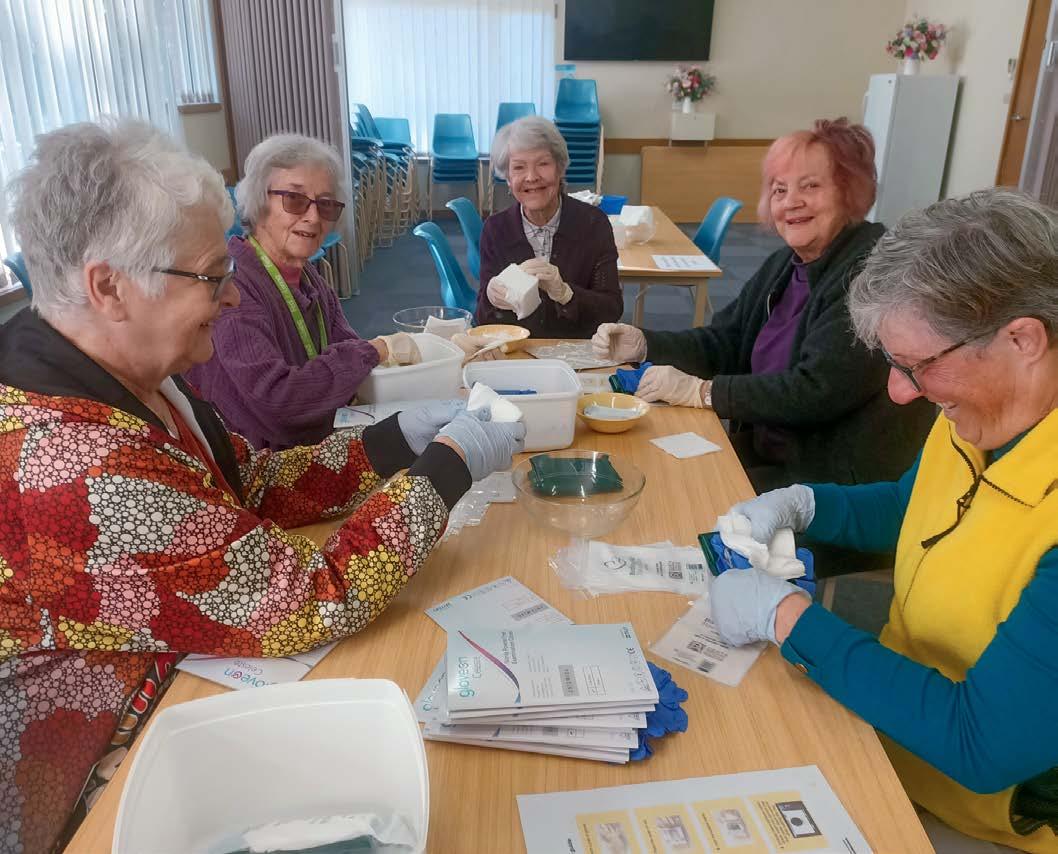

































As part of the Synod’s 2023-26 Disability Action Plan, eLM is offering free online training for all Ministers, Lay Leaders and Church Councils.
The ACCESSIBLE WORSHIP workshop will be presented online by the Centre for Accessibility Australia, and will include:-
How people with disability engage with content
Policy and legislation on making content accessible
Making your Worship Service accessible
Making your content accessible (Websites, newsletters and the promotion of church activities on Social Media).
This online training is being offered either as:
One FOUR-HOUR afternoon session. 1pm-5pm Thursday 19 September OR
T wo TWO-HOUR evening sessions. 6pm-8pm Monday 9 and Tuesday 10 September.
For further information or to reserve your place: www.victas.uca.org.au/events
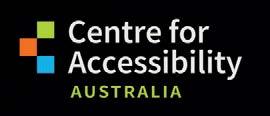


Reverend David Fotheringham Moderator
It reminds us that at the base of all we do as a Church is this foundation: We love, because God first loved us.
The Bible opens with a wonderful, big-picture view of God and the whole universe – the biggest picture view that we could imagine.
By God’s word, light and life come into being, and it is good.
My own love for big-picture stories like this comes from my background in physics.
I’ve always been in awe of the incredible way in which the whole universe hangs together from the cosmological to the quantum scales.
But I also love the way that the creation story in Genesis 1 immediately gives way to the creation story in Genesis 2, which is all much closer to home.
God walks around, makes a few friends (literally), and plants a garden that is both beautiful and a place of provision.
Not all of us are excited by the ‘bigpicture’ stories, or look to find God there.
For most of us, the more significant stories are about encountering God in the domestic, local, personal stories of life and relationships.
I recently used a version of this contrast in a sermon at the retirement of someone who has provided significant leadership to the church in some of the ‘big picture’ roles for many years, recognising that the impacts on the smaller pictures were actually where the greatest significance was to be found.
This year’s meeting of the national council of the Church, the Assembly, will have concluded by the time that this article is being read.
The Assembly is considering a number of significant matters for the life and ordering of the Church.
As I write this, I don’t know what the Assembly will determine about those matters. But what I do know is that the ‘big picture’ matters being considered by the Assembly have their greatest significance in the effect that they have locally, in personal stories of mission and ministry and in lives that are liberated and celebrated.
I enjoy engaging with big-picture conversations, and appreciate all of the prayers that are going into the discernment work of the Assembly, at the 2024 meeting and into the future.
In the meantime, I see examples of God’s story in lives of people in so many ways, celebrated locally: in the commissioning celebration of a new Director of Mission for Uniting deeply supported by her congregation, colleagues, and thoughtful inclusive liturgy; in the funeral of a faithful, humble theological leader who has impacted so many lives throughout the Synod; in a gathering of First and Second Peoples in Fanny Cochrane Smith’s church; in personal acts of service and worship that I see or, often, don’t see but hear about second- or third- hand by people whose lives have been touched; and in the baptism of a baby.
My own child is being baptised this weekend, as I write this article.
This is the littlest, most intimate story, where the love of the God of the whole universe is recognised as extending to this little child, who barely even knows it yet.
It reminds us that at the base of all we do as a Church is this foundation: We love, because God first loved us.
Rev Charissa Suli made history last month when she was installed as the Uniting Church in Australia’s youngest President.
By Rebecca Beisler
For Rev Charissa Suli it was an “Emmaus Walk” moment.
On the short road between Collaroy and Dee Why on Sydney’s Northern Beaches, Charissa felt a deep and unshakeable call from God to dedicate her life to serving Christ within the Uniting Church.
It was October 29, 2007 and Charissa was 25 and a young mum of three daughters.
A few years before she and her husband Langi made a pivotal decision to return “home” to the faith community where Charissa was baptised - the Uniting Church’s Cecil Gribble Tongan Congregation in Dee Why, named after a beloved missionary to Tonga.
They soon became involved in its youth group, Sunday School and lay preaching.
As a young leader with an exceptional gift for singing, Charissa was invited by Rev Salesi Faupula (now Moderator-elect of the Synod of Victoria and Tasmania) to attend a NSW/ACT Synod Cross Cultural event at Collaroy and lead worship.
Charissa clearly remembers not wanting to go, suspecting the occasion would be predominantly for people much older and unlike her.
However, she went along with Langi and two other young adults, and it changed her life.
In a surprising and enlightening way, Charissa found herself at a truly multicultural event.
“I was taken aback that a lot of the people leading at the front were actually migrant women,” she recalls.
Korean Minister Rev Aeryun Lee presented a session in the morning, and it was the first time Charissa had seen an Asian female Minister.
In the afternoon, Fijian-Rotuman Minister Rev Dr Seforosa Carroll led a Bible study.
“I remember sitting there listening to Sef,” Charissa recalls.
“She was inspiring and I was like, ‘Wow, She's a Pacific Islander, and she's a Rev. She looks so young’.
“And I remember from that moment, I thought, ‘I could do that’.”

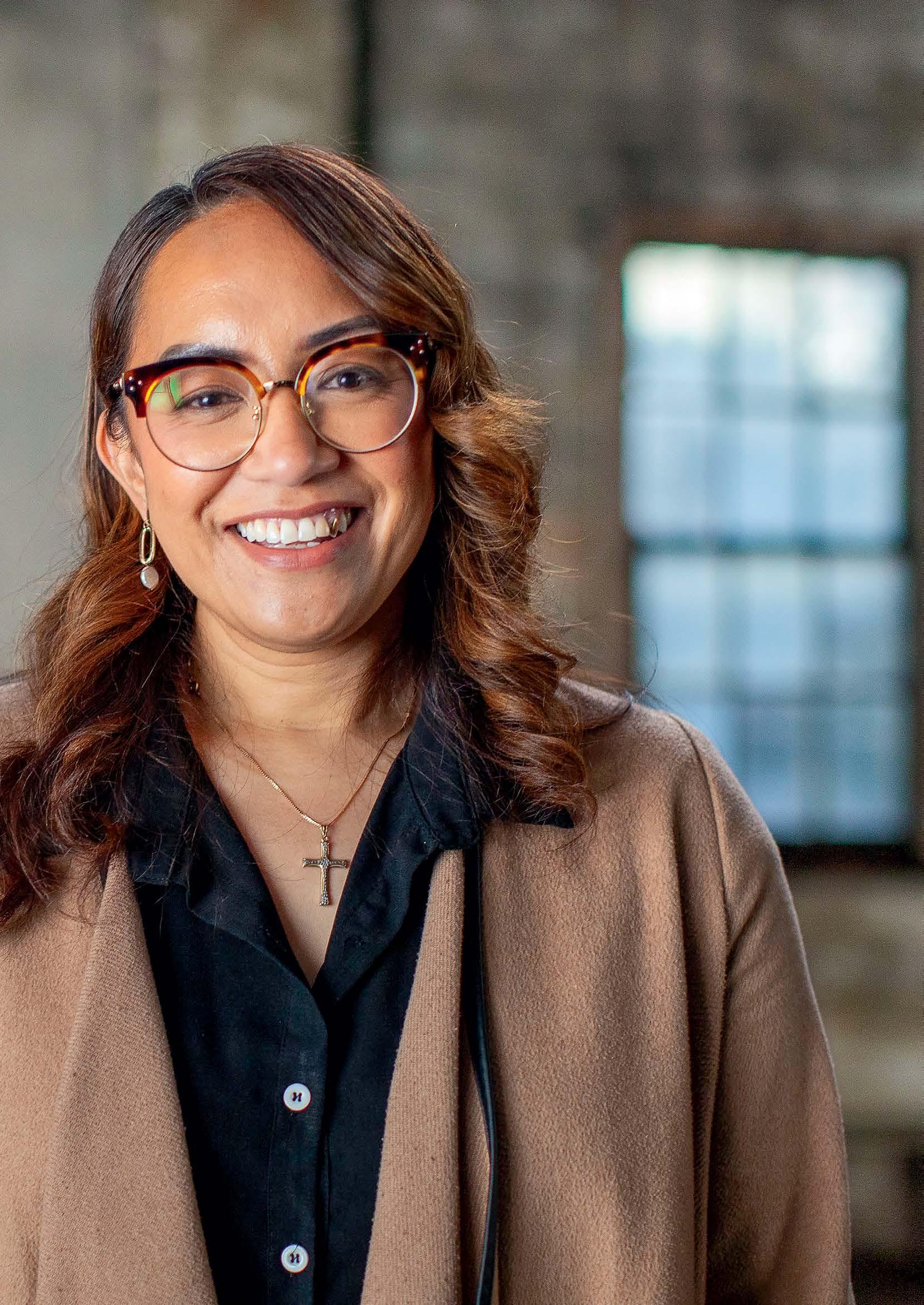
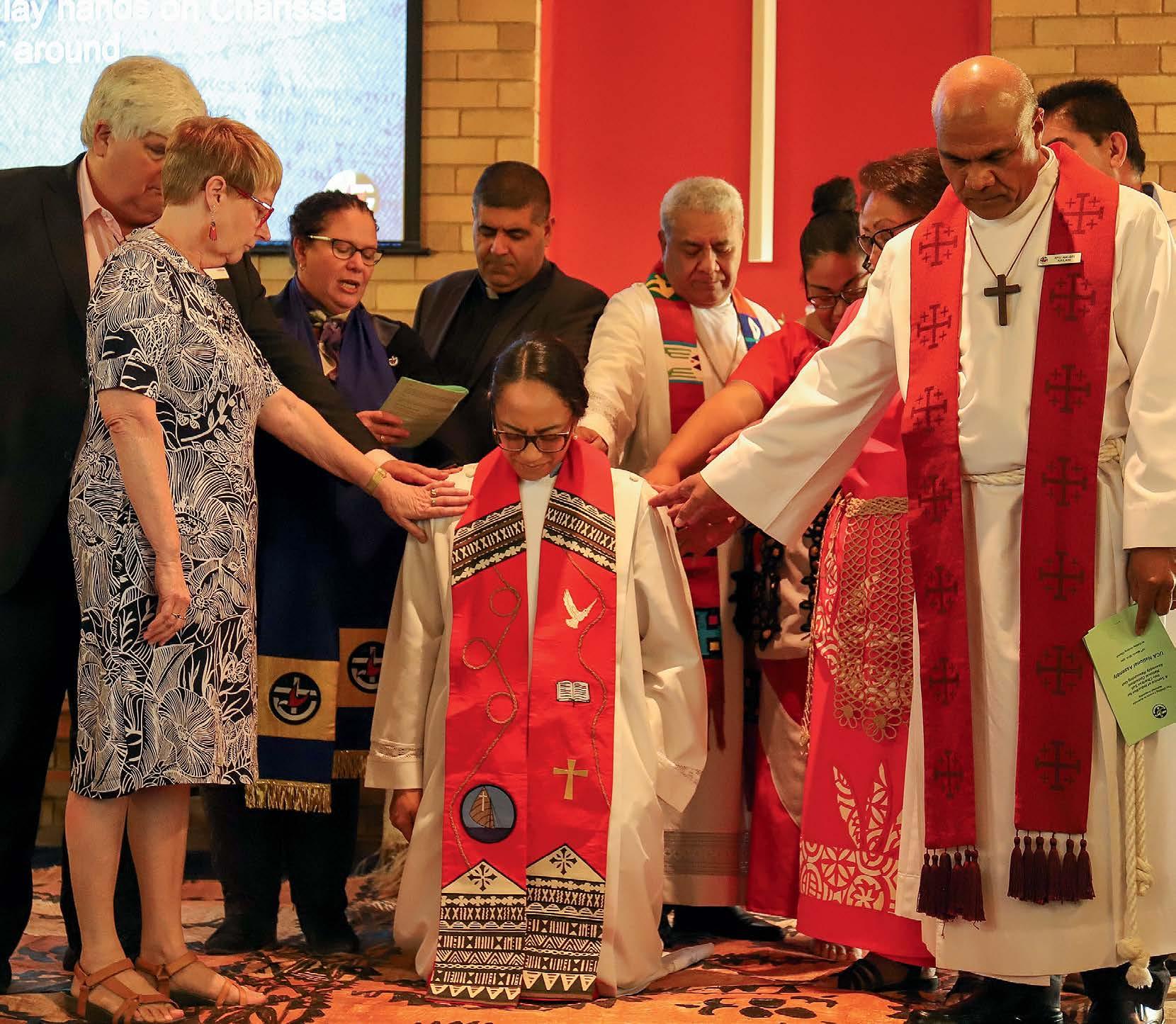
On that day Charissa also met Rev Dr Tony Floyd, then Assembly Multicultural and Cross-Cultural Ministry National Director.
It was the beginning of a friendship and mentorship that would open the door for Charissa to the wider national church and begin her thinking about her identity as a second-generation Tongan woman.
So, on the way home that day, a short 5km drive from Collaroy to Dee Why, Charissa tells Langi to pull over on the side of the road.
“I say to him, there is this thing I need to tell you,” she recalls.
“I am crying my eyes out, and he says to me, ‘I know what you're going to say’. And I say to him, ‘look, I just need to tell you’, and we both turn to each other.
“I say, ‘I want to become a Minister’, and Langi says to me, ‘you should become a Minister’.
“It literally was the Emmaus Walk where our hearts were on fire.”
In this defining moment Charissa’s journey of ministry and service began, culminating last month in an historic moment in the life of the Uniting Church.
On July 11, Charissa was installed as the 17th President of the Uniting Church, the first person of colour, of Pacifica heritage, and of Tongan descent, to lead the church nationally, and the youngest to serve in the role.
At a time of great challenge, Charissa will offer spiritual leadership to the Church.
She will draw upon her deep faith in Jesus and her Pacifica heritage, which have played a central and grounding role through seemingly impossible challenges on her path to leadership.
In the 1970s, Charissa’s grandparents left Tonga for New Zealand with their 12 children, sacrificing all they had for the
sake of future generations.
Charissa was born in Australia and schooled in New Zealand, until she and her mother returned to Australia to be closer to her elder brother, who was having his first child.
However, at 16 Charissa’s indomitable spirit was forged in the crucible of early motherhood.
She married Langi and gave birth to their baby girl, Susitina.
“It changed the whole narrative of my life,” she says.
“I had no choice but to drop out of high school.
“I was a child having a child. I grew up very quickly.”
Carrying the shame of a teenage pregnancy, Charissa describes the years that followed as a time of “wilderness”.
“There was so much heavy baggage,” she says.
“Life was so hard, and we felt so poor.
“The thing that held tight, I truly believe, for myself and Langi and our family, was our faith in God.”
With the foundational support of her mother, her husband and her deep faith, Charissa forged a path ahead.
She became successful in finance and marketing, and she and Langi had two more daughters, Kina and Latu, and more recently, a son, Azariah Inoke.
Fast forward to 2007 and having just experienced a powerful call to ministry, Charissa made the decision to quit her job, forgo her six-figure salary and begin a Period of Discernment.
Again, Charissa pushed back against cultural expectations and boundaries, with many questioning her sense of call.
She pushed past the doubters and has not looked back.
“I believe we need a renewal of our commitment to the Gospel,” she says.
“We need to reflect deeply on what it means to be the body of Christ together.
“If the business agenda and our strategic plans become more important to us than the Gospel and our relationship with God and each other, then we need to flip the script, because it should be the other way around.”
The image used in the theme is one of weaving, a communal practice and honoured skill in many cultures.
The process of lalanga (weaving) the Tongan fala (mat) is a highly valued craft,
challenges the Church must face is its own structural and cultural racism.
“I believe a lot of the structural racism is unconscious in the Church, and because we’re not aware of it, it actually hinders how we can be in relationship,” she says.
“We need to dismantle structural racism, ensuring that the commitments we’ve made are not just symbolic but deeply embedded in our governance and practices.”
This starts with how we can be in a better relationship with the First Peoples of this country and with the Uniting Aboriginal and Islander Christian Congress, says Charissa.
"It’s unbelievable but I’m humbled as I stand on the shoulders of giants who have come before me."
Rev Charissa Suli
She began work as a Cross-Cultural Consultant for the Synod of NSW/ACT.
In this role, she attended an executive meeting of the Uniting Church Tongan National Conference and met another key mentor, Rev Dr Jason Kioa, Chairperson at that time of the TNC.
At that meeting, Jason and the executive appointed Charissa as a second-generation leader, a role she held for 10 years, and which cultivated her gifts for leadership and her passion for intercultural and intergenerational ministry.
Charissa completed her theological studies with a Bachelor of Theology and, in 2014, was ordained as a Minister of the Word in the Uniting Church.
She first served as Minister at Dapto Uniting Church, then as Assembly National Consultant and most recently with Sydney Presbytery.
She has a Graduate Diploma in Ministry and is currently completing a Masters in Theological Studies.
The theme Charissa chose for last month’s Assembly was ‘Threads of Love: Weaving Christ’s love across cultures and boundaries’, representing the bold vision she holds for a spiritual renewal across the Church.
requiring commitment, patience, skill and intentionality, and is a source of fellowship and joy.
“Each strand of the Fala is important to each other in the same way that the Holy Spirit gifts and empowers all members of the Church,” Charissa says.
“A reference to Paul's Letter to the Colossians (3:14), and ‘threads of love’ spotlights the transformative love of Christ.
“The key point for me is that as Christians and people of faith we underestimate how broad, wide and deep the love of Christ is and that Christ’s love is so powerful that it can hold our diversity, if we would just take a chance and allow Christ’s love to transform us from within.”
As well as weaving the mat so there is space for all, Charissa says the theme also calls the church to “unweave” the strands that hinder us.
“The theme calls for self-reflection and action to address the broken strands, in our society and in the Church,” she says.
“This involves identifying areas of inequality and injustice, lamenting past wrongs and working actively towards healing and transformation.”
For Charissa, one of the greatest
“I truly believe until First Nations people feel and find their voice in the Uniting Church, only then can we Second Peoples find our voice too, and that needs to be our first priority,” she says.
As a proud Tongan, she has long been an advocate for the culturally diverse voices of the church to be elevated and celebrated.
“When people say the Church is dying, it is often focused on a particular group of the Church which is predominantly the white Anglo communities,” Charissa says.
“When I look at the CALD communities, they are growing their number, impact and mission.
“I believe there’s an opportunity for migrants and indigenous communities to influence how we offer hospitality and be in relationship with each other in the Uniting Church.
“This journey requires a commitment to ongoing reformation and renewal and the space for grace.”
Looking back on the Emmaus Walk experience on the road from Collaroy to Dee Why, Charissa is still in awe at the journey God has taken her on.
“I still can’t wrap my head around it, it’s unbelievable but I’m humbled as I stand on the shoulders of giants who have come before me,” she says.
Rebecca Beisler is Joint National Manager: Media and Communications with the Uniting Church in Australia Assembly

By Marina Williams
Celebrating 80 years of ministry, Rev Bill Morgan says he is living an extraordinary life, and one devoted to God, family and community.
An unwavering faith has provided the spiritual anchor and strength to guide him through more than a century of life, witnessing immense changes in the world – two world wars, global pandemics, economic depression, myriad technological advances, as well as personal triumphs and tragedies – with compassion, wisdom and dedication to service.
Ordained in the Presbyterian Church in Malvern on April 24, 1944, Bill was a Minister at churches in South Australia, Victoria and Tasmania.
At the union of the Congregational, Methodist and Presbyterian churches in 1977 he became a member of the Uniting Church.
In 1984, Bill retired from active ministry, serving in a pastoral capacity for the next 20 years.
In recognition of his 80th anniversary of ordination, a Service of Thanksgiving was held at Glen Waverley Uniting
Church on June 2, with Bill joined by his three children, Heather, John and Libby, and extended family.
“Faith is not static,” the 108-yearold says, reflecting on his longevity of service.
“In many ways it's undefinable, (but) it grows out of experiences.
“It’s a feeling, it's an attitude, it's a belief, with all of those things wrapped up, and faith inspires you to go on.
“As Christians and members of the Church, we are here to commend God to others, so that they may find the same joy, peace and purpose we do.”
Of his father’s career, John says it’s likely he has led more than 6000 services, and officiated at countless weddings, including for family.
“He married his children and some of his grandchildren, and it’s something very special that we hold dear,” John says.
With eight grandchildren and 17 great-grandchildren, Bill is proud of his achievements but also humble.
“I enjoy people, enjoy reading and sharing experiences,” he says.
“It’s wonderful to connect with people and I’m extremely grateful that at 108 I can carry on a conversation like this one, although I don’t like any fuss, I prefer to talk about God and faith than myself.”
Family played a formative role in shaping Bill’s strong character and values.
Born on October 23, 1915 in Melbourne’s inner west, Bill grew up in a working-class family of five boys and one girl.
“My parents were Scottish, and believed in values,” he says proudly.
Bill fondly recalls a home filled with much love, patience and laughter, with many family trips to the football on Saturdays to watch Footscray.
“I missed the Grand Final win in 1954 as I was officiating at a wedding, so I was very excited that John took me to the grand final in 2016 and we saw them win,” Bill says.
Education was equally important, with Bill attending Scotch College in Melbourne, becoming school captain in 1935. He excelled at sport, captained the rowing team and played in the 1st XVIII.
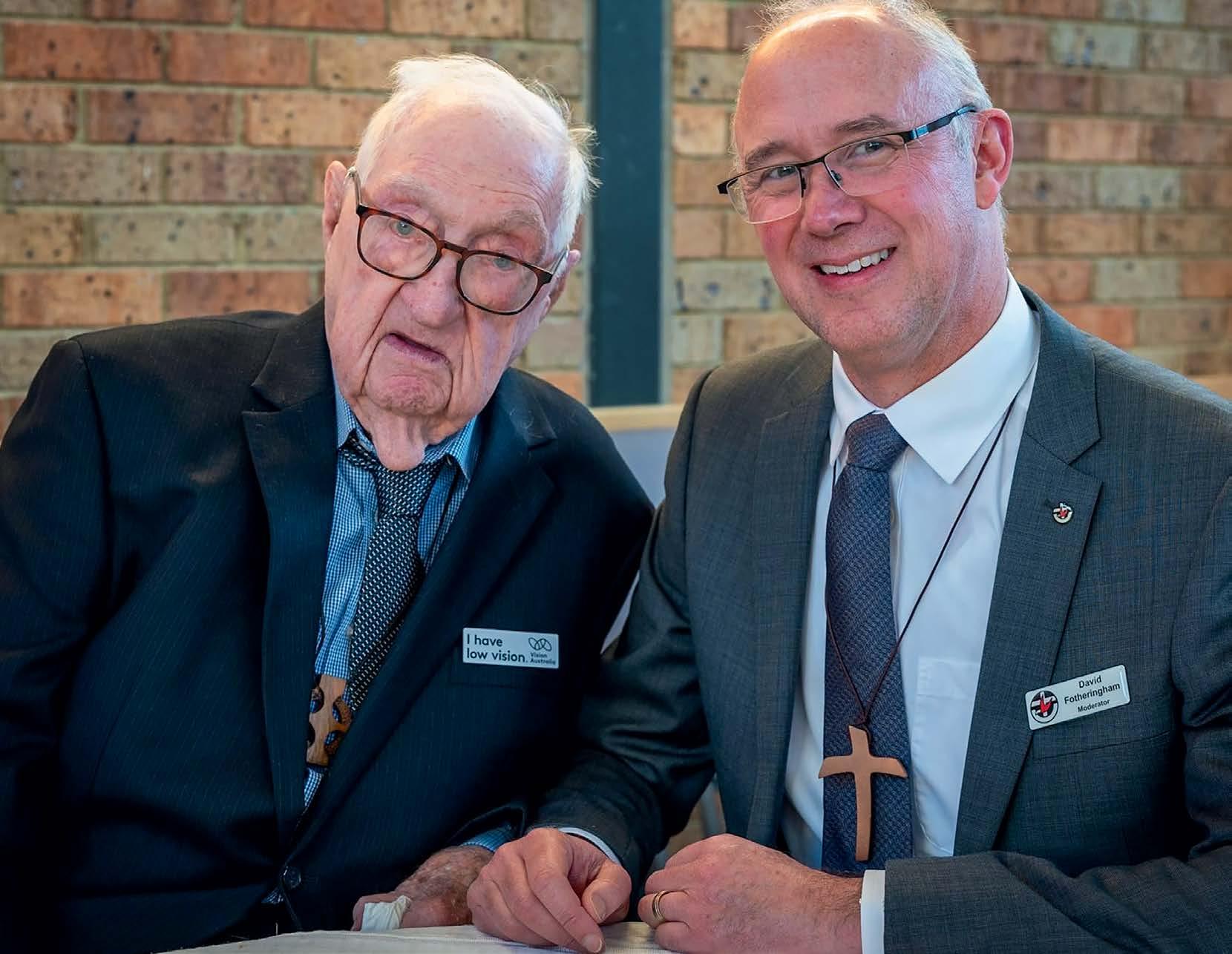
llHe later played rugby for Victoria while studying for the ministry at Melbourne University.
“It was a happy childhood, we did things together, we learnt to disagree with each other and, yet, stay fixed as a family, and that was an influence later in my life, because I could very often draw on some of those experiences,” Bill says.
He says his Mum nurtured engagement with the church and he vividly remembers a comment to his eldest brother, Jim, following an argument.
“He was going to church, and Mum said to him ‘I hope you come home a better boy than when you left’,” Bill recalls. “What a wonderful way to look at church. Whether you had an argument, church makes you better.”
Their loving example instilled perseverance that carried Bill through life's challenges, including the death of his parents, his siblings and two wives –Joan, the mother of his children, in 1957, and Jessie, who he met and married later in life, in 2011. Bill radiates a contagious enthusiasm for life, as well as
independence, only recently moving into an aged-care facility.
“He finally thought he was old enough to move in,” daughter Libby says.
Equally quick with the quip, Bill adds: “Although I’m not sure this is the last chapter or the epilogue.”
His secret to shepherding congregations for 80 years is actively listening to peoples’ struggles.
“You've got to learn to listen to people … stop, listen and see what their difficulties are,” Bill says.
Describing it as an “unforgettable experience”, he remains most proud of leading the Ormond congregation “to buy a piece of land alongside the church to build Kirkside, an aged-care place for 15 people.
"He built a congregation willing to accept leadership,” John says.
“He was pleased that he was respected and always showed compassion.”
Living a values-led life brings opportunity for the faithful to serve others and uplift communities for generations, says Bill, even in a changing world and Church.
“Always remember the vows you made when you became a member of the church and honour them through thick and thin,” he says.
“Ministers will come and go, but the congregation remains. You stand fast.”
His advice to ministers is equally simple.
“Remember, it's not a job, it’s a calling from God to serve people in all situations of life, in all conditions of life … it's a great opportunity.”
Although mobility issues are limiting his physical activities (he stopped playing golf at 95), Bill remains busy, joyfully declaring “it's still nice to be alive”.
“I have always tried to stay active and look after my health,” he says.
“While I'm not able to walk as well as I used to, or run or play football anymore, I still enjoy getting out and about when I can.
“I am off to play carpet bowls this afternoon.
"Even though I can’t see as well as I used to, I’m relying on God to help guide the bowl.”
Andy Calder headed into a well-deserved 'rewirement' recently, leaving an indelible mark on pastoral care education and disability advocacy within the Uniting Church.
By Andrew Humphries
Rev (Deacon) Dr Andy Calder likes to joke that it’s not retirement he headed into last month.
The word he prefers to use is ‘rewirement’, an opportunity to step back and see where new directions might take him.
Whatever the future holds, the quietly spoken former equipping Leadership for Mission staff member will leave huge shoes to fill within the Uniting Church in Victoria and Tasmania.
As the Director of Clinical Pastoral
Education through the John Paver Centre, and through his work as the Synod’s Disability Inclusion Advocate, Andy has been at the forefront of pastoral care education and advocating for people with a disability.
Since taking on the role of inaugural Director in 2010, Andy has overseen Uniting CPE-The John Paver Centre’s role in providing an education and formation platform for those wanting to pursue pastoral care.
The Centre’s courses have resulted
in accreditation for 80 students, while two important initiatives have been the development of an eco-ministry program, and the establishment of a program in Ballarat last year following collaboration between the Presbytery of Western Victoria and Ballarat Base Hospital.
Andy has handed over the reins as CPE Centre Director to Rev Lauren Mosso, who is also an accredited CPE Supervisor.
Lauren was ordained in 2011 after a


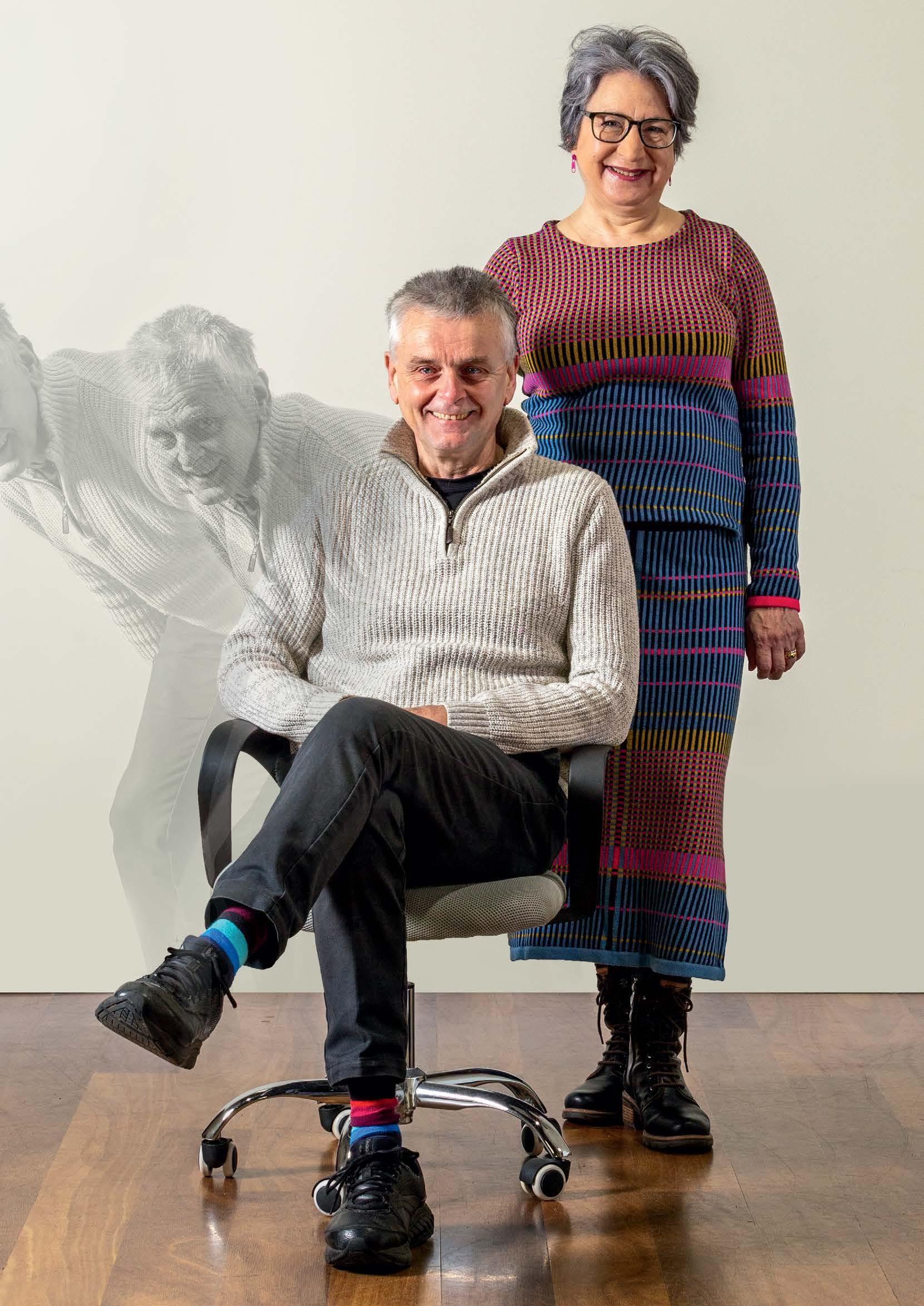



“We have one example of someone who was recommended by their Image:
career as a conciliator of discrimination and workers’ compensation disputes, and also served as the Synod’s Ethical Standards Officer from 2012-15 and Senior Chaplain at Epworth HealthCare from 2015-22.
Lauren was a student in the CPE program in 2011 and has first-hand knowledge of how well it equips people for pastoral care roles.
“My own experience means that I can recommend the program as part of ongoing formation and it was certainly beneficial for me,” Lauren says.
“It’s a very important program for laying down a platform for high-quality pastoral care.
“Pastoral care is really important in allowing us to listen deeply … and to give people the space to speak about what is important to them and to make meaning of their own situation.”
Andy says the role of CPE Centre Director offers a unique opportunity to build on a foundation of pastoral care which is nearly a century old.
“It’s founded on a particular methodology which started in the 1920s in the United States, which says the relationship of care is understood as a ‘living human document’,” he says.
“It’s a very rigorous process, a fact which sometimes surprises people, and it demands a level of reflection from people who may not have done so much of that in the past.
“Part of the course is about equipping people to have more confidence in their own skills and to develop a sense of where the person they are talking to wants to go, without dictating the agenda or the conversation.
“I get a huge buzz from seeing people come in, who have no real idea of what it is that they have signed up for, begin to blossom during this time, and the onus is on us to create an environment and space in which they can thrive.
“We encourage and we challenge, if we think someone can be challenged a bit.”
Andy says there are wonderful examples of how the CPE program has had a huge impact on the life of students.
Image: Carl Rainer


Presbytery and had been a volunteer chaplain at a hospital in country Victoria,” Andy says.
“They did two CPE programs with us and, on the basis of the skills and confidence they developed through that, they were then appointed to the pastoral care program in that hospital.”
Lauren says the CPE program allows students an opportunity to blossom.
“People become more their authentic self and they learn a lot about their own spirituality and how that holds them when they are holding space for someone else,” she says.
the Synod of Victoria and Tasmania.
“The CPE role has been very satisfying and encouraging and I had terrific support from the Uniting Church to establish the CPE Centre and then to support it as well as they have,” he says.
“It’s been wonderful to see people come into the course and shift and change their perspectives, and take
shouldn’t be there. Providing resources and a profile for people with a disability is hugely important and, again, the Uniting Church has played a vital role in seeing the vision of inclusion for people with a disability.
“Since 2000, Disability Action Plans have provided a really good framework for work plans and for getting the wider Church involved in what we are doing.
"Both roles have been a huge part of my life and I know that I’m going to miss so much of the work."
Andy Calder
“It often involves a sense of coming to peace with the different parts of their personality, meaning they can live with a new sense of freedom.”
Andy says the pastoral care and disability advocacy roles have been a richly rewarding part of his work within
responsibility and develop a sense of belief that they can offer something significant to people in their caring role.
“The disability advocacy role has been a real life force for me, focused on valuing people regardless of who they are, so they can find a place in our Uniting Church life that is free of discrimination and barriers that
“I have also chaired the Synod’s Royal Disability Commission taskforce for the last five years, which has been rewarding.
“I feel enormously privileged to have had the disability advocacy role and cherish the fact that I have been able to be a part of it all. Both roles have been a huge part of my life and I know that I’m going to miss so much of the work, but I’m also ready to look at what other things might be out there for me.
“As someone else once famously said, ‘it’s time’.”
Moments after walking into worship at Pilgrim Uniting Church Yarraville, Lauris Knight felt comfortable.
By her third visit Lauris was certain and overcome with relief that she had found her new spiritual home.
“It was a powerful feeling, and one my friends felt, too,” she says, reflecting on the day nearly two years ago that marked the end of a five-month search by a worshipping group from Altona Meadows Laverton Uniting Church (AML) to find a new place of worship.
At the time, Lauris was a long-term member and council secretary of AML, which had decided to close its English-speaking service following a congregational viability study.
AML continues to be part of the community in Melbourne’s south west, offering its first service 46 years ago.
As with many churches, congregation numbers have fluctuated through the years.
In 2022, the small congregation offered two church services – at 10am and 2pm.
Lauris worshipped at what the congregation called the ‘10am worshipping community’.
“We are in a multicultural community, and we offered a morning service in
By Marina Williams
English and an afternoon service in Fijian,” she says.
Combined services were regularly conducted with a joint church council, but dwindling numbers meant “we were struggling to do all the extras outside of church council”.
“Many of us had been worshipping together since 1982,” she says of the 10am congregation.
“We were a very tight and familyoriented community.
“We weren’t an older congregation, we were intergenerational, but that meant young families have other activities to do on weekends.
“It just got too much financially and emotionally for us … we were getting worn down a bit and we realised we had to make a change.”
In listening to the congregation’s concerns, the Presbytery of Port Phillip West suggested the Church Council complete a congregational viability study.
Willingly engaged, the findings were not unexpected, says Lauris, yet the process enabled them to make an “informed decision”.
“It confirmed what we knew in our hearts and had discussed as a
group – remaining on our own was not sustainable in the long term,” she says.
“As a small congregation we just didn’t have the energy or time needed to run the business side of the church – maintenance of an ageing building, bookings, run activities – and that was affecting how some of us were enjoying our worship.”
Presbytery Minister Rev Narelle Collas supported AML through its review and discernment, and says the council was empowered to make its own decisions, while identifying strengths and weaknesses when exploring viable ministry options.
AML’s story, Narelle says, provides insights into how congregations can navigate viability concerns and embrace change through a process that examines more than just attendance or finances.
“We also look at spiritual viability, and placement,” she says.
“How well has a congregation sustained placements, how they treat ministers, how close are they to other Uniting Church congregations, their leadership viability and how well they are maintaining their property.
“It helps congregations deal with the reality of where they're at and,
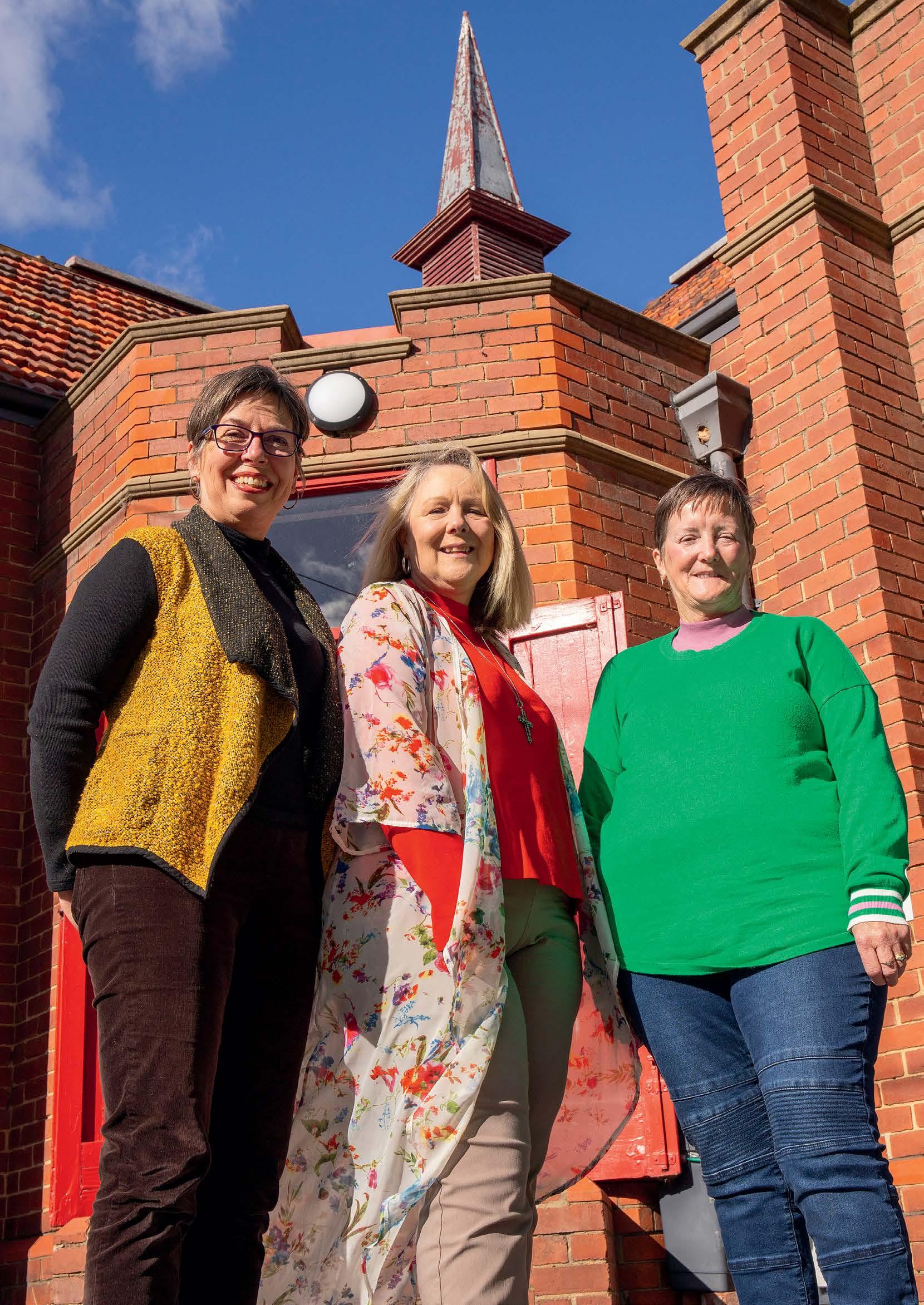
on completing the review, AML was prepared to be courageous and make hard decisions on their future.”
Following the study, the 10am members actively explored options for their future.
“We tried worshipping in homes and visited various churches around the area, but it was difficult to find the right fit as we’ve always sat in a circle,” Lauris says.
“We’ve never been in pews. There were no other churches around that fitted our style of worship.”
Until, she says, the ‘10am worshipping community’ visited Pilgrim.
“Our friend Rev Ikani Vaitohi was being inducted as Minister at Pilgrim, so a couple of us went along to support him,” Lauris says.
“We thought the place had a lovely feel to it, and the people were lovely, so we continued to visit, and felt God was definitely guiding us there.”
Lauris is proud her old friend is the Minister at Pilgrim.
“He is marvellous and shows wonderful spiritual leadership; it is amazing to think how his move also helped guide us to Pilgrim,” she says.
While the 10am community formally decided to close and move to Pilgrim in September 2022, the 2pm community chose to continue worshipping at the AML site.
It has since experienced a growth in numbers and continues to work with the Presbytery.
“AML's journey demonstrates how a Presbytery can walk alongside a congregation with empathy, rituals, and a process to empower decision making,” Narelle says.
“It also shows that change can bring new life, as the merged Pilgrim congregation and growing Fijian group have found.
“Most importantly, it illustrates that discernment requires considering more than numbers: the spiritual health and joy of God's people must come first.”
The decision to move was unanimous, Lauris says, and “the welcome incredible”.
“We didn't go through formal amalgamations or anything like that,”

she says. "We all agreed to go because we enjoyed worshipping together, and we didn't want to fragment.
“Right from the beginning, we were made to feel part of the Pilgrim community.
“We were greeted with smiles and open arms, and felt they were genuinely interested in us as a person and family.
“We felt connected, they are good Christian people.”
The connection was mutual, says Ros Harris, Church Council Chair at Pilgrim UC.
“We instantly recognised shared values in their worship, and connections quickly formed between members,” Ros says.
“Helping make it a success, we believe, was Lauris and the group not approaching the church as strangers.
“They visited Pilgrim church several times to get a feel for their new community.”
The Presbytery guided and supported the congregation through rituals of closure and welcome.
Welcoming AML meant Pilgrim being open to its own transformation, Ros says.
“Flexibility and collaboration are in our DNA,” she says.
“Pilgrim formed in 1989 through the merger of four surrounding churches, so we understand change and the importance of nurturing people through that.
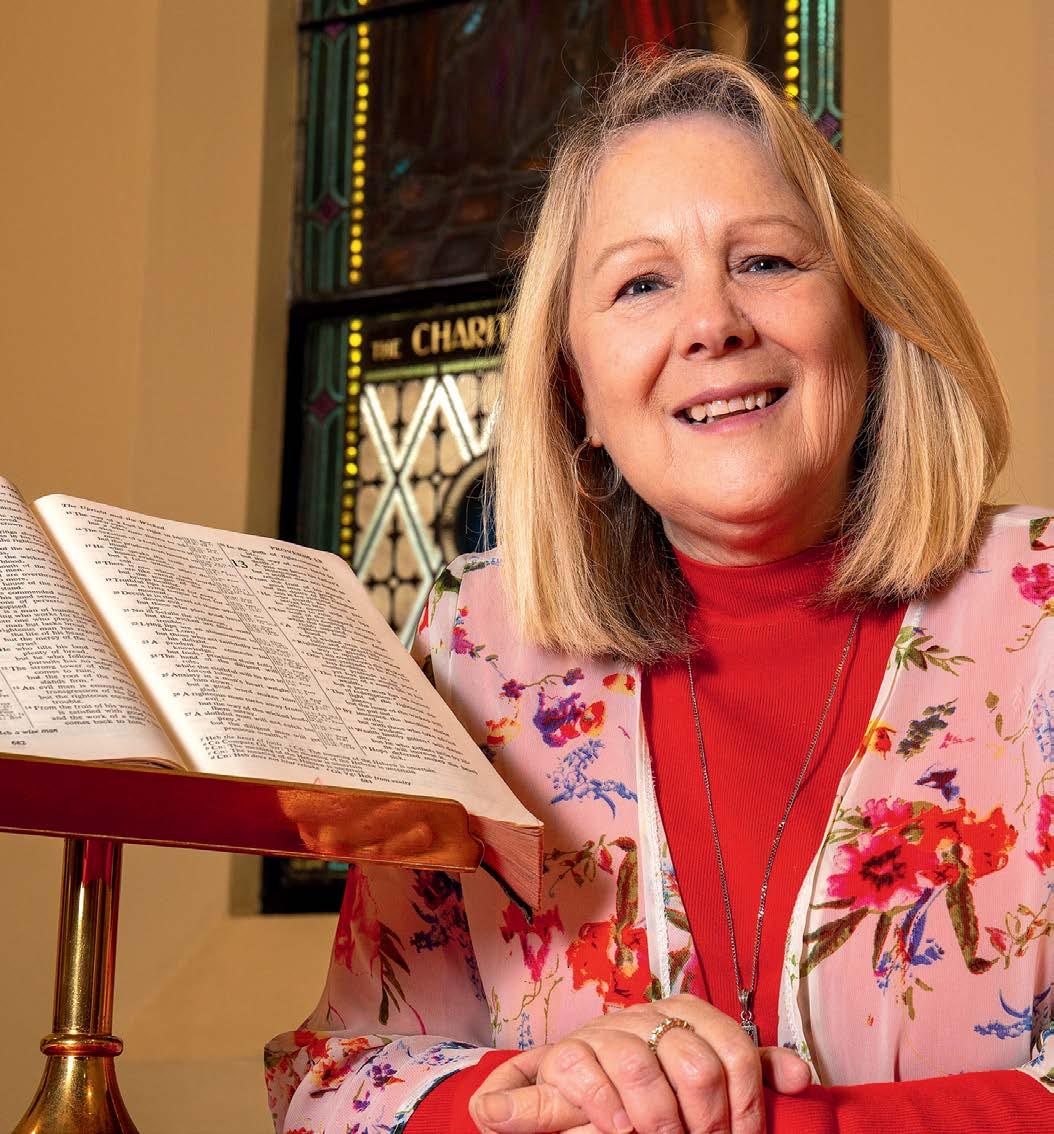
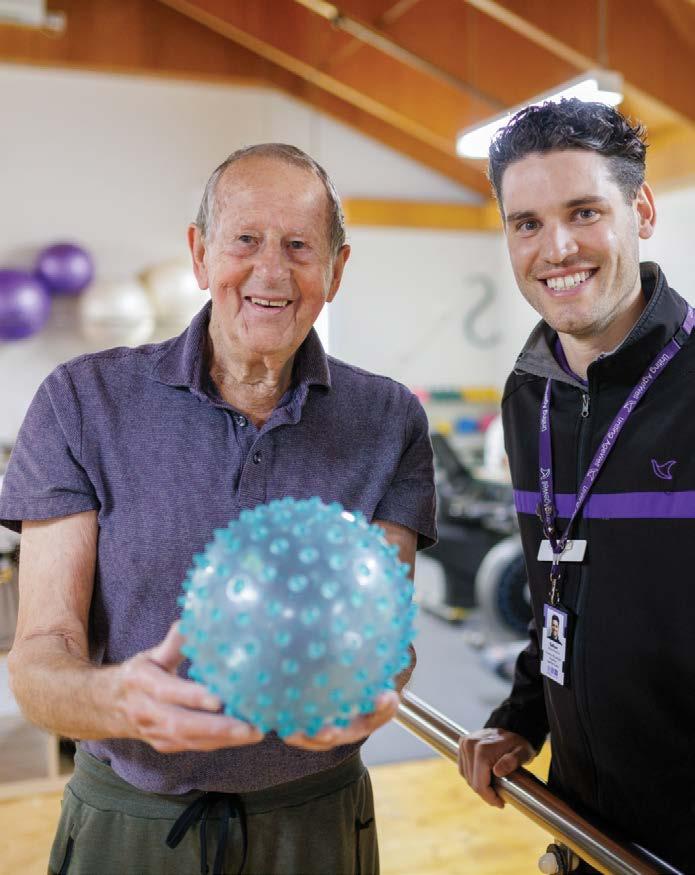
Rev Narelle Collas says the AML members’ move to Pilgrim shows how deep engagement between congregation and Presbytery can have many benefits.
Image: Carl Rainer
“The congregation didn’t want to pressure their new members into formal roles or force them to conform to our way of doing things.
“Instead, we extended a gentle invitation to participate in whatever way they felt called.
“Over time, this has allowed AML’s gifts to shine as they take on leadership roles as elders, worship leaders and committee members.”
Lauris advised congregations considering change to "embrace it and see it as a positive”.
“With Narelle's gentle guidance through the viability study, we were able to discern God's calling,” she says.
Get assistance with personal and clinical care, household chores, assistive technology and transport
“Our journey has shown that with openness and community, change can strengthen rather than weaken one’s faith.” Living well with choice and peace of mind
Remain connected with social groups, outings, health and therapy services, seniors gym and carer services
Maintain an independent lifestyle in one of our vibrant retirement living communities
Specialist 24/7 care and support, including dementia and palliative care and respite stays, within safe and caring communities
With services across Victoria and Tasmania, Uniting AgeWell's expert team can help you find the right services to meet your needs. Call us today! 1300 783 435
unitingagewell.org
Born just over 20 years after Tasmania’s establishment as a colony, Scots Uniting Church’s place in Hobart’s long history will be recognised on September 8.
By Andrew Humphries

Andrea Wicks and Scots Uniting Church in Hobart go back a long way, all the way to 1952, in fact.
Andrea was baptised at Scots Presbyterian that year, married her husband Paul there in 1975, and for most of her life the historic church in Bathurst Street has been a constant companion on her faith journey.
With such a strong connection, it seems entirely appropriate that Andrea is leading the organising committee responsible for marking the church’s 200th anniversary on September 8.
“It’s a huge thing to be a part of, and I feel very honoured to be involved in
organising the anniversary,” she says.
“Sometimes it feels a bit daunting but we, as a team, are working through it.
“I’m a fairly organised sort of person, we are a good team, and it’s all going well.”
Organising such a special occasion has provided Andrea with an opportunity to reflect on the important role Scots has played, not only in her own life but in the lives of family members who came before her.
Andrea’s paternal grandparents, Edward Kay and Eliza Isabel (nee McClymont), were married in what was then St Andrew’s, by the Reverend
Dr James Scott in 1902. Her mum and dad, Joyce and Lindsay Kay, were both heavily involved with the church, and life as part of the Scots community remains one of Andrea’s treasured childhood memories.
“Dad was an elder of the church and mum was part of the Presbyterian Women’s Association, so they were both very involved,” Andrea says.
“Church life was a very big part of my childhood, and I can remember a wonderful camaraderie shared by the people who attended.
“I really enjoyed going to Sunday school there and the church itself offered
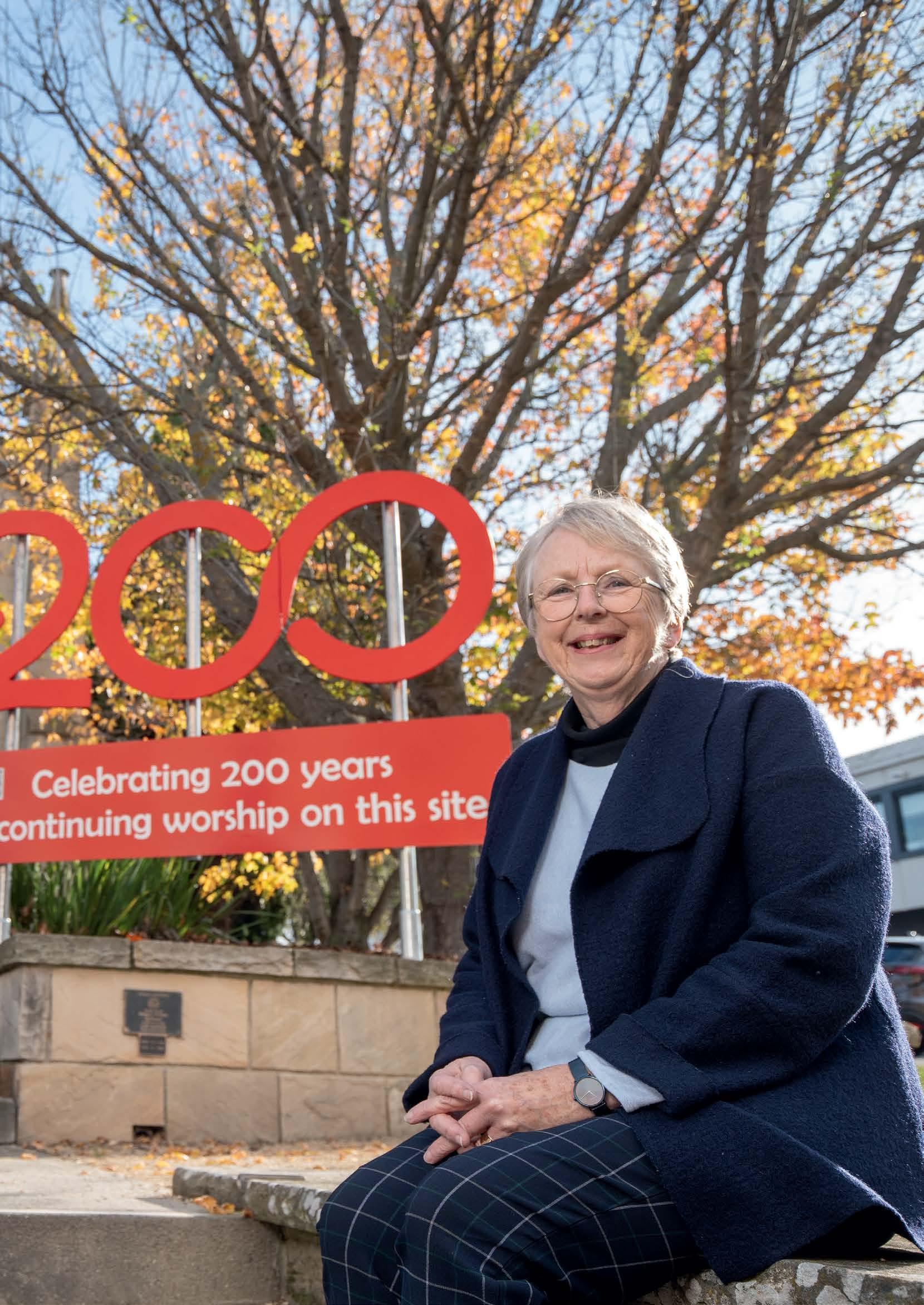
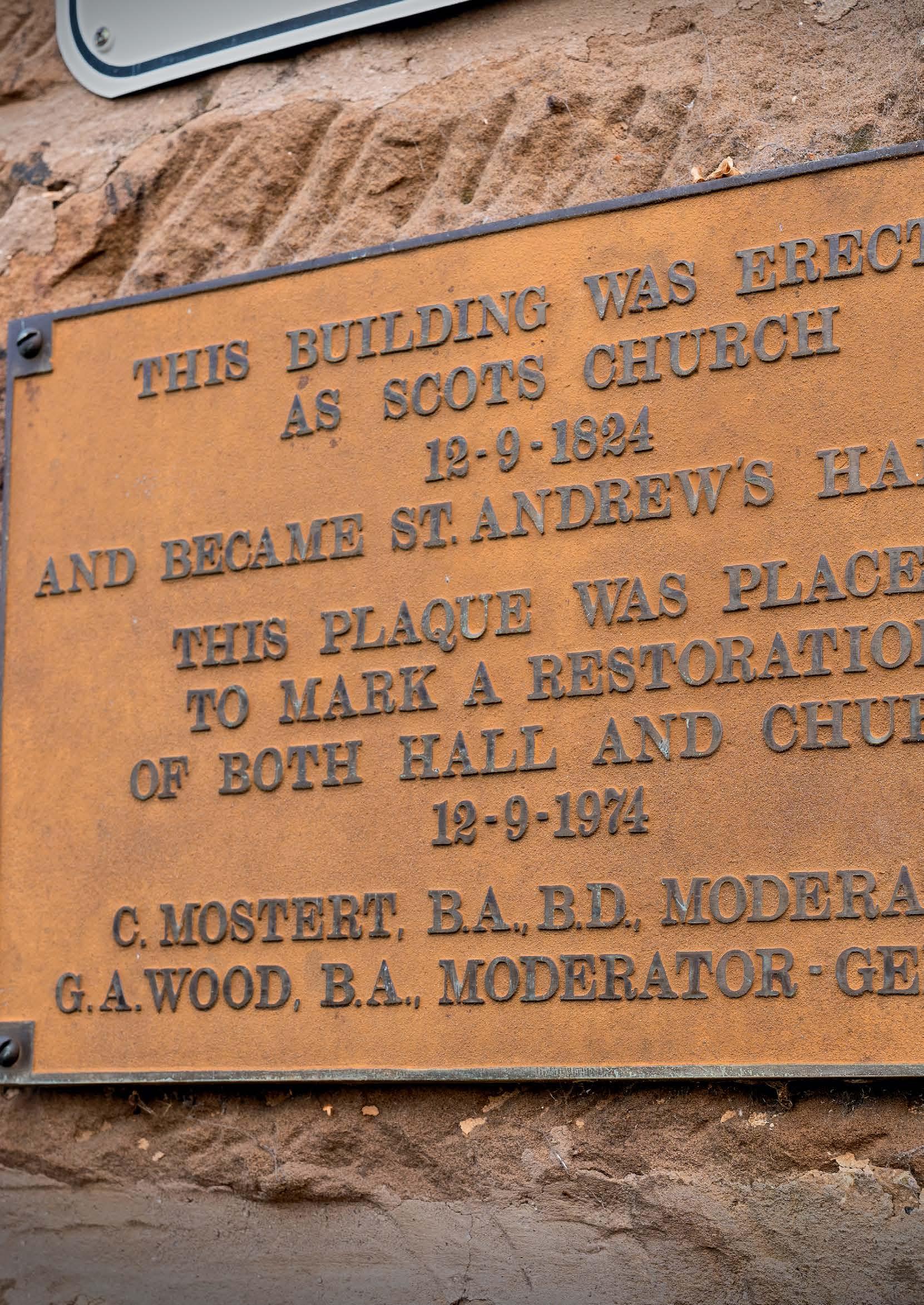

The colony of Tasmania was only about 20 years old when worship began at Scots.

1821
A group of Scottish settlers, unhappy with having to worship in St David’s Church of England, come together to establish the Presbyterian form of worship in Hobart Town. The settlers are granted a block of land in Bathurst Street, extending back as far as Melville Street
1823
A committee of management is established and arrangements made to raise funds for a church building
1824
The first service in Scots Kirk is conducted by Reverend Archibald Macarthur on Sunday, September 12
1834
The foundation stone is laid for a new church
1836
The new church (St Andrew’s) is built and dedicated, and opens for regular worship (the Kirk became known as St Andrew’s Hall and has been used continually since)
1935
St Andrew’s and Chalmers Church (formerly Free Church of Scotland) amalgamate and St Andrew’s Church becomes known as Scots Church
a special sense of belonging.
“The church always seemed to be quite full during a service and there was always a good number of people worshipping there.”
During her childhood, Andrea remembers some inspiring ministers, including Rev Hector Dunn and Rev G.A. Wood.
“Rev Wood was quite an interesting man and was actually the minister at our wedding in 1975,” Andrea recalls.
“The other minister I remember well was Hector Dunn, who was quite an inspiring presence with a booming voice.”
With preparations now in full swing, Andrea hopes to see as many people as possible at the September anniversary to celebrate Scots’ role in Tasmanian, Presbyterian and Uniting Church history.
“The service on September 8 is going to mark this wonderful journey we have been on for 200 years,” she says.
“We’re inviting people to come along and share it with us and then enjoy morning tea afterwards.”
Those attending will also hear the sound of bagpipes, marking the church’s strong original link to Scotland, and paying tribute to those people of faith who, 200 years ago, believed that the Presbyterian church should have a presence in the emerging colony of Tasmania.
“I think if those people were still around today they would be very pleased and proud of the fact that the congregation is still going,” Andrea says.
“They fought hard for the land on which to build a church and for what they were able to achieve.
“That strong determination they showed 200 years ago is still needed today, because churches are closing everywhere and ministers are sometimes difficult to find.
“So the challenges are a little bit different but they are still there today.”
Despite the challenges, Andrea hopes someone else will have the privilege in 2074 of organising a 250th anniversary, as this remarkable piece of Hobart’s history continues to flourish.
“Oh, that would be wonderful, but we
Scots has been an important part of Hobart’s history for 200 years.
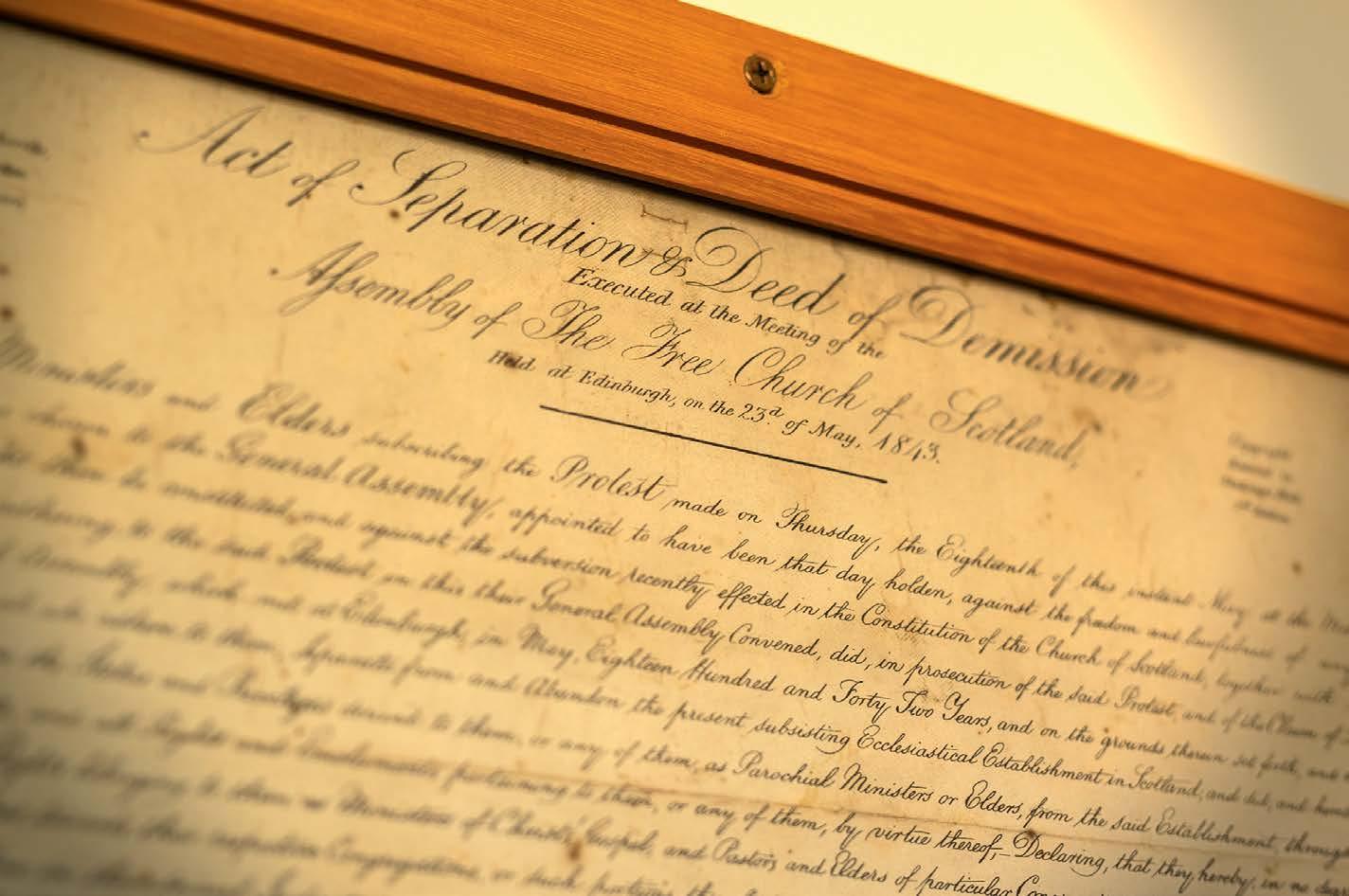
need to see some more young people coming through,” she says.
“A lot of people walk by Scots, park their car here or walk through the gardens, without realising what we have here and the many activities associated with our church.
“They accept that it’s here, though, and there is a strength within the fact that it has been such a big part of Hobart’s history.
“There is such a lot of history tying Scots to the early years of Tasmania.”
Andrea’s Scots connection of over 70 years continues to sustain her, and she is looking forward to hearing similar stories on September 8 from people about their connection with the church.
“Scots has been such a hugely important part of my life and has been my spiritual home,” Andrea says.
“It’s where I feel safe and the church family is a very special one.
“Scots is a very loving and inclusive community, congregation members are very welcoming and it’s a wonderfully communal church.
“It’s been a wonderfully fulfilling part of my life.”
Those wishing to attend the September 8 service can email scots. hobart200@gmail.com, while a website on the event is at www.scotschurch. com.au/celebration-200/

By Rohan Pryor
Two centuries is a long time in human terms, and spans more than 10,000 Sundays, or one tenth of the life of the Christian church since the first experience of Pentecost.
This long span of time disappears in the face of immediate human needs for food, shelter and safety, connection and care.
A person living on the streets of Hobart or amid a mental health crisis does not care about the past, or even the future – the present moment is where they can experience God’s loving care through another human being, or a companion animal, or a choir of voices.
outward-focused mission and through the gathered ministry of a community of faith.
"The present moment is where they can experience God’s loving care."
Rohan Pryor
It is these fleeting moments of eternal love and grace present now which the Church seeks to provide to each one in need, and to the whole of God’s creation.
It is these fleeting moments of divine presence and care which the Scots church and its predecessors have offered to the people of Hobart, through
Christian worship is not a Sundaymorning club of inward-focused friends, but a recurring reminder of purpose and a renewal of heart for the everyday mission of Christian disciples: sharing good news in actions as well as words; being good news through meeting human need; embodying good news amid the pain and loss of life; incarnating hope, faith and love. The Presbytery of Tasmania and the Synod of Victoria and Tasmania joins with the Scots-Memorial congregation to celebrate milestones big and small: moments of God’s grace experienced amid the long span of days, centuries, and eternity.
Rohan Pryor is Presbytery Chairperson, Presbytery of Tasmania, and Synod Liaison Minister (Tasmania) with the Synod of Victoria and Tasmania
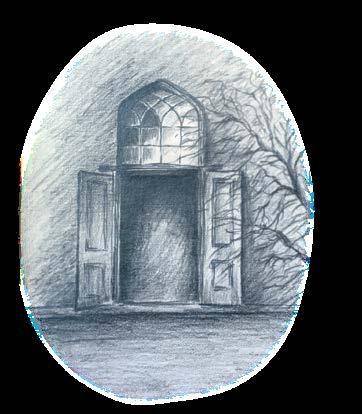
While the first service was held in 1824, the foundations for worship were laid in 1821 when a group of Scottish settlers, unhappy with having to worship in St David’s Church of England, came together to establish the Presbyterian form of worship in Hobart Town.
Members of the group then wrote to the Associate Presbytery in Edinburgh asking for an ordained minister to be sent to the colony, and also requested a grant of land from Hobart Town’s Lieutenant Governor on which to build a church.
They were granted a block of land in Bathurst Street adjacent to the Prisoners’ Barracks, later known as the Hobart Gaol.
A further grant of land was received to be used as a cemetery.
Answering the call to minister

in Hobart Town was the Reverend Archibald Macarthur, a young, intelligent and gifted orator from Edinburgh.
Rev Macarthur arrived in Hobart Town in 1822 as the first Presbyterian minister in Australia, and on January 5, 1823 he conducted the first Presbyterian service in Hobart Town in a room on the corner of Murray and Macquarie streets.
At a meeting in February 1823, a committee of management was established and arrangements were made for the minister’s salary, and to raise funds for a church building.
With funds raised by the public, a small kirk, or church, of freestone was built at the rear of the Bathurst Street allotment.
The kirk was designed by William Hartley Wilson, who was also responsible for the design and construction of
Tasmania’s historic Richmond Bridge.
Scots Kirk was built by convict labour in an ashlar style and later a two-storey manse was built on site for the minister and his growing family.
The first service in Scots Kirk was conducted by Rev Macarthur on Sunday, September 12, 1824.
Scots Kirk was used for worship until 1836 and, by this time, a new church (St Andrew’s) had been built, dedicated and opened for regular worship in June 1836.
In 1935, when the congregations of St Andrew’s and Chalmers Church (formerly Free Church of Scotland) amalgamated, St Andrew’s Church became known as Scots Church.
The Kirk became known as St Andrew’s Hall and has been used continually since and is now used for meetings, as the minister’s office and Scots Museum.
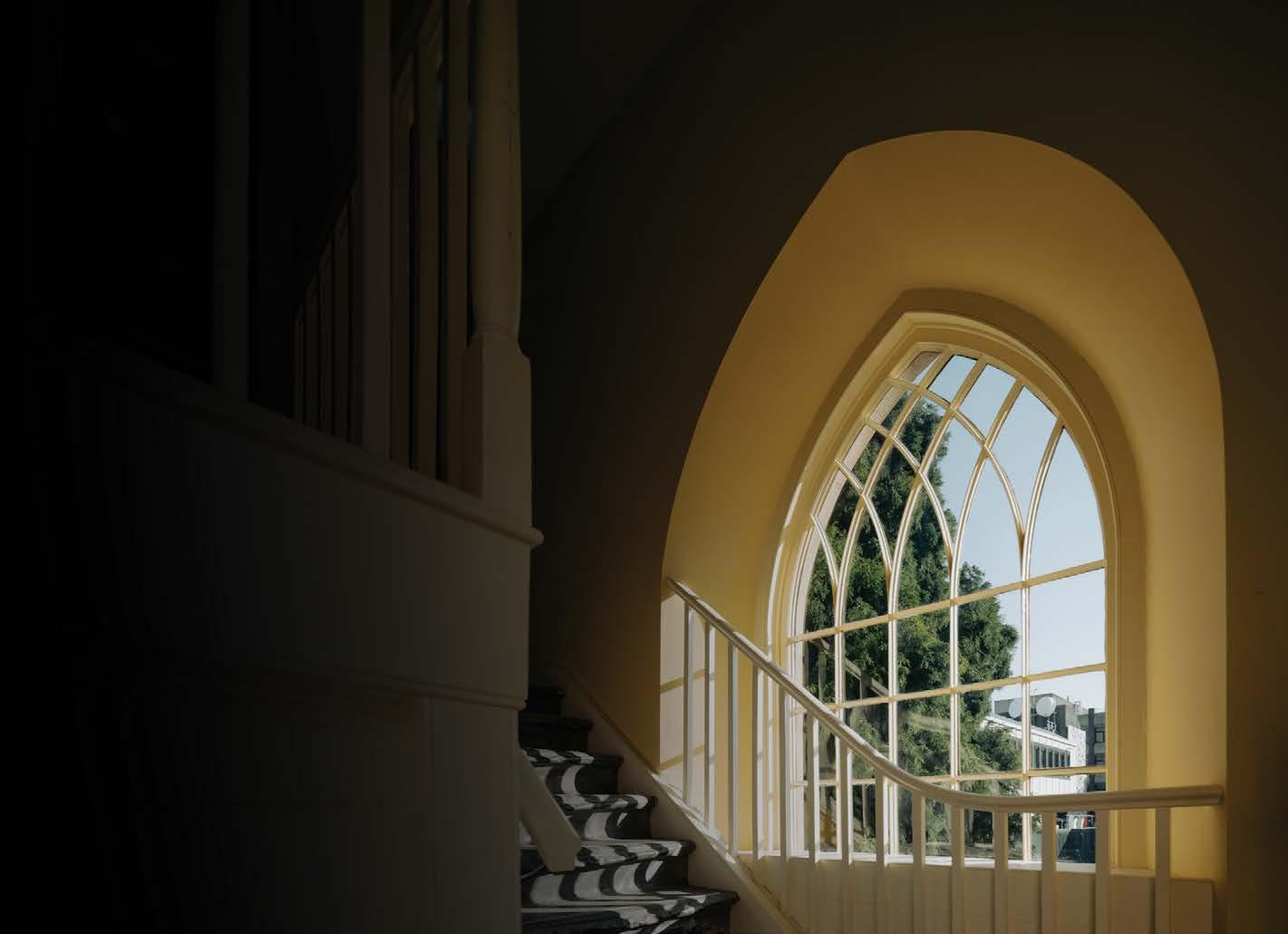

Treaties with First Nations peoples are a crucial mechanism by which we can build on efforts to correct the historical injustice of the colonial period.
Australian history is built on colonial conquest.
Some people talk about nonindigenous Australians living on “stolen” land.
For me, that does not cut it.
The British Empire did not travel to the South Pacific to do a spot of shoplifting.
The British Empire was built on brutal military conquest and exploitation of the people and lands conquered.
The historical ripples of that conquest are still felt in Australia today, especially by First Nations peoples who, on average, remain disadvantaged in Australia.
I am quick to point out that none of us alive today took part in that period of conquest.
However, we have the opportunity to work towards correcting the historical injustice.
Treaties with First Nations peoples are a crucial mechanism by which we can build on efforts to correct the historical injustice of the colonial period.
If you are already sold on the need for us to act in support of fixing the historical injustice and grasp how our theology leads to the need for such action, you can skip ahead to the end at this point to find out how to support a treaty process in Victoria.
Correcting an injustice or making reparations for harm that has occurred in the immediate past is much simpler than addressing a historical injustice where those who caused the original injustice and those who were immediately impacted by it are all long dead.
Such efforts to put things right move from individual compensation to seeking a socially just society for everyone.
Our Synod has long understood that
is what is needed. In their submission to the 1984 Victorian Parliamentary inquiry into ‘Compensation to Victorian Aborigines for Dispossession and Dispersal’, the Synod and Victorian Anglican Church recognised that a “compensation” for the injustices and harms of the racist colonial past needed to be material and structural, moving beyond symbolism. The submission stated:
In particular, the main denominational Churches and the Australian Council of Churches’ advocacy of Aboriginal Land Rights since the sixties symbolises a reformation in Churches’ thinking: from silence to advocacy; from paternalism to an opening up of new possibilities for power-sharing; and from protectionism to a recognition of the right of Aboriginal self-determination.
The view of the Synod in 1984 aligned with recent work by US-based scholar of Nigerian background, Olúfémi Táíwó, who has argued, “Reparation, like the broader struggle for social justice, is concerned with building the just world to come”.
His words echo the Christian theology of seeing God reconciling the world to God’s self and our need to seek to be in right relationship with God and other people (2 Corinthians 5:19-20).
Historically Jesus had direct experience of living under a conquering empire.
Much like the later British Empire, the Roman Empire exploited conquered lands for financial gain.
However, from the time of Constantine, Christianity became twisted to serve the interests of empire.
The topic is well explored in the 2003 work by theologian Douglas John Hall,
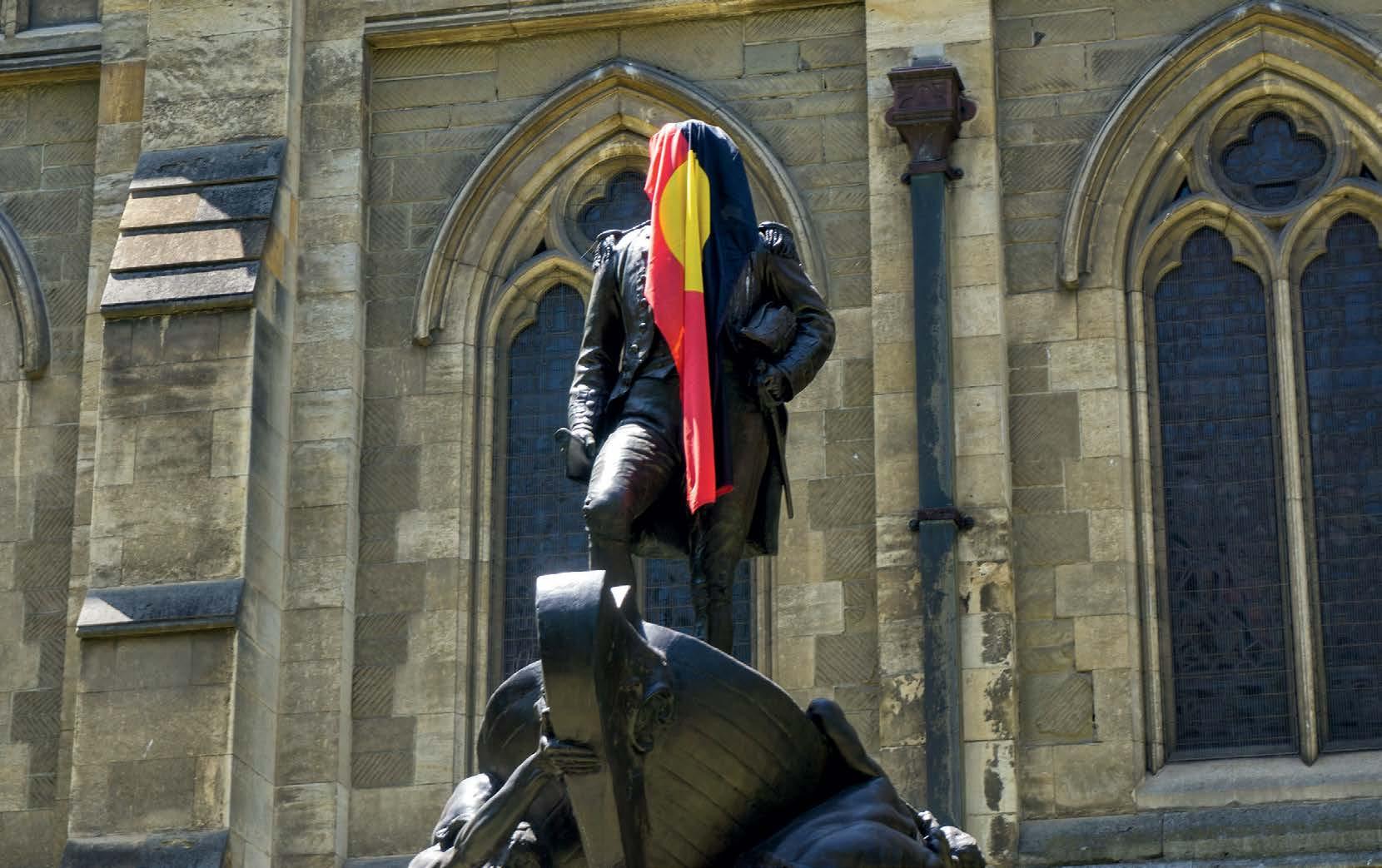
‘The Cross in Our Context’. Hall argued for the rejection of imperial theologies, and that instead, the church should be attentive to the suffering in the world around us.
He argued that if the church does not take on correcting the burden of suffering around it, “then its whole life must be called into question”.
In 2016, before the Statement from the Heart was made at Uluru by First Nations representatives, Victoria began a process to commit itself to the reforms needed to see the aspirations of self-determination finally flourish through a formal statebased treaty process with First Peoples.
International experience in places like New Zealand, Canada and the US is that treaties with First Peoples are one of the best ways to address the injustices of the racist colonial past (https://www.atns. net.au/international-treaties).
The US alone has over 300 treaties with Native Americans.
In August 2018, with bipartisan support, the Victorian Parliament enacted the ‘Advancing the Treaty Process with Aboriginal Victorians Act 2018’.
This historic legislation paved the way for forming the First Peoples’ Assembly of Victoria, which comprises 32 traditional owners of Victoria to ensure it represents the state's diversity.
Each of the formally recognised traditional owner groups is allocated
one seat, with the remaining 21 being democratically elected seats split across six regions.
The legislation purposefully does not specify who the treaty will be with or the areas that will be included within it.
The silence on these issues allows for self-determination so the groups that want a treaty can negotiate for themselves.
The approach means there is scope for more than one treaty to be negotiated.
As far back as 1988, the National Assembly meeting of delegates from congregations across all of Australia adopted a resolution that committed the Uniting Church:
To support efforts to work beyond the concept of the compact proposed by the Australian Government towards a form of treaty that is an enforceable agreement obtained through formal and full negotiations between Aboriginal political structures and those of the wider Australian community, an agreement which Aboriginal people can use to protect their interests.
The National Assembly and Synod meetings in 2000 and the 2019 Synod meeting expressed support for treaties with Australia’s First Nations peoples.
Negotiations between the Victorian Government and the Victorian First Peoples’ Assembly will commence soon.
The Victorian treaty process is unique in Australia, and is currently leading the
nation as proof that a pathway toward addressing the unfinished business of tackling the colonial past is possible.
It will not require a referendum to ratify any final treaties that are negotiated.
The Victorian First Peoples’ Assembly is calling on Victorian organisations to sign a statement expressing their support for the treaty process.
If you want a copy of the statement to consider for your faith community, congregation or presbytery signing on, contact the Synod Justice and International Mission Cluster with an email to jim@victas.uca.org.au.
I would offer one final suggestion to congregations and faith communities considering supporting the Victorian treaty process.
Please do not make it about guilt.
Scholar Liam Kofi Bright, in his 2023 paper ‘White Psychodrama’, argued that “white” people having arguments over whether they should feel guilty about the racist colonial past does not in itself address the ongoing injustices experienced by the descendants of those who were colonised.
Instead, it acts as a barrier to those who might otherwise support action to correct historical injustices.
Make your discussion about how we work together towards a world where First Peoples can obtain justice for past wrongs.



By Andrew Humphries
With the perfect role model right in front of them, Hobart twin sisters Grace and Ayla Williams are beginning to make their own mark on indigenous affairs within Tasmania.
In Uniting Aboriginal and Islander Christian Congress Leprena manager Alison Overeem, Grace and Ayla have one of Tasmania’s most respected indigenous figures as their mentor, continuing a relationship which began in a Hobart children’s centre when the girls were just two months old. That relationship was strengthened seven years ago when Grace’s art took her to Leprena and a request for permission from Alison to paint a wall there as part of a grant from Arts Tasmania.
“I found out Alison was working at Leprena, so I knocked on her door and said, ‘can I paint here?’,” Grace says.
“It was that wall that started it all and Ayla and I began working here at Leprena as volunteers.”
For Grace and Ayla, their roles within Leprena and the Uniting Church as part of the work being done for the wider indigenous community, have become a hugely important part of their lives.
Ayla says their work within Leprena
brings challenges but also a great sense of accomplishment.
“We are involved with such a diverse range of things, depending on the needs of the community at any particular time,” Ayla says.
“One day we might be doing something around NAIDOC Week and the next day it might be outreach work.
“A lot of what we do is very informal and we don’t take ourselves too seriously, and that is important because our community doesn’t respond well to an office type of setup.
“It’s a relationship founded on everyone being on an equal footing, and no one ever feels that there is a hierarchy, which is something that fits within the Uniting Church as well.”
Ayla says she and Grace continue to learn much from the way Alison goes about her work as Leprena manager, and as part of the wider indigenous community in Tasmania.
“I learn a lot by just watching her, and how she conducts her work,” Ayla says.
“She and I sit on multiple committees together, and she also provides opportunities for us to take the lead on issues.
“We might come into work one day and she’ll say, ‘okay, you girls are leading the welcome to country at an event this morning’, or ‘the Governor is coming and you are leading a particular element of that visit’, and even if we’ve been shaking with nerves we have had that support to flourish.”
That sense of confidence means Grace and Ayla feel ready to take the next step in leadership, while also acknowledging the complexities around Tasmania’s indigenous community.
“I do feel that we are emerging now in terms of leadership around indigenous issues,” Ayla says.
“Grace is acknowledged very widely as a Tasmanian palawa artist, while I’m probably recognised more within the realm of the Uniting Church in terms of leadership. I haven’t always been comfortable with that because it means stepping out of your comfort zone and putting yourself out there, which can take a lot of courage and leave you vulnerable.
“It’s been a complex but good journey.”
And for Grace and Ayla, it’s a journey that is only just beginning.
By Andrew Humphries
Warragul Uniting Church member David Morison only has to listen to the sound of children playing at the adjacent St Andrew’s Kindergarten to know how important the battle against climate change has become.
As a grandfather himself, David worries about the world we will be leaving future generations if we don’t do all we can to limit our use of fossil fuels.
It’s why the work he, and fellow congregation member Brian Ramage, have done in driving renewable energy options within the church is so important.
The pair make quite a team, with retired optician and former OPSM senior manager David looking after the administration side of things, while Brian adds the engineering expertise.
“As quite a few of us have home solar systems, Brian, a retired engineer, took on the project of finding a more sustainable and cost-effective system for the church,” David says.
“Brian is the nuts and bolts part of the operation, while I’m the numbers cruncher.
“We work well and the Church Council is very supportive of what we’re doing.”
A concerted push away from the use of gas, and towards solar energy, has paid dividends for the congregation, on both
an environmental and financial basis.
As a long-standing member of the Church Council, David was familiar with its financial position and says it was becoming apparent that a serious look at renewable energy options was needed if it was to have any sort of long-term financial future.
“We hear a great deal these days about the cost of living crisis impacting many Australians, and the same applies to churches like ours,” he says.
“Our energy costs have increased dramatically and those costs were starting to frighten us when we had a good look at them.
“One of our solutions was to look at solar panels as a means of reducing our electricity costs, and a complete project was put together and presented to the congregation late last year.
“We asked the congregation if they were prepared to come on board, both financially and with support in general.
“The acceptance was overwhelming and donations received covered the cost of solar panel installation, with a tidy sum left over to commence the gas reduction project.
“As this project will drastically reduce the kindergarten’s energy costs, they also came on board with a substantial contribution.”


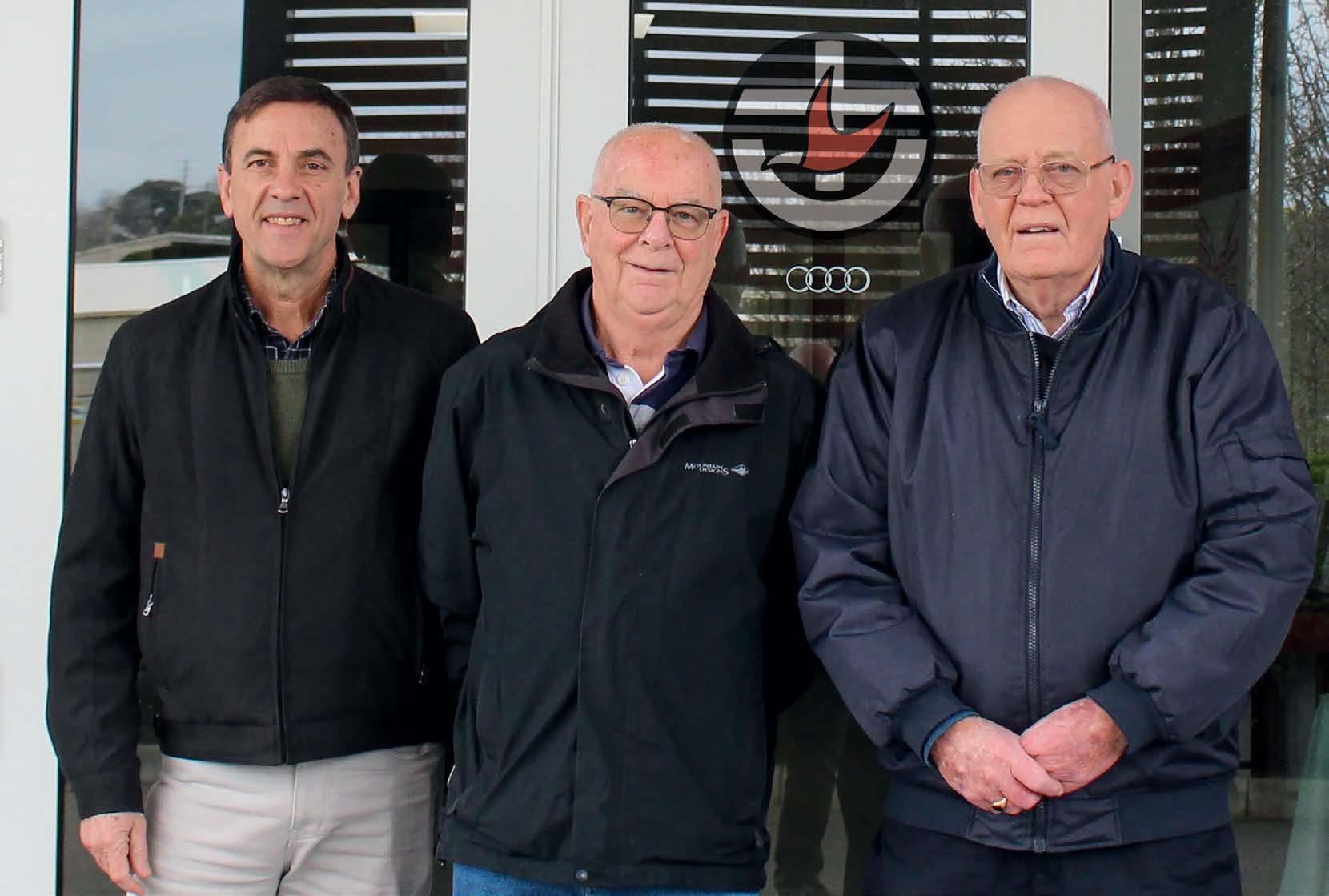
About 60 panels were installed, meaning a significant reduction in costs for the congregation and kindergarten.
“Under the memorandum of understanding we have with the kinder, it’s responsible for paying 50 per cent of the energy costs, so we were keen to put something in place that negated the amount they had to contribute,” David says.
“We were able to put enough solar panels on so that the only bills that come through will be for supply charge only, and the amount of electricity we put back into the grid will just about pay for that as well.”
The work hasn’t gone unnoticed at the kindergarten, run by Uniting VicTas, with St Andrew’s teacher Belinda Medlyn saying the children are now reaping the rewards of the congregation’s planning and hard work.
And, in the process, it’s teaching the children a lesson or two about looking after the environment.
“We were eager to work alongside the church to install the solar panels as it would benefit both groups, and we think we’ll save about $6000 a year on electricity bills, plus the feed-in tariffs,” Belinda says.
“We're all working towards being carbon neutral and doing our bit to reduce global warming, in line
with Uniting Church goals." With the installation of solar panels ticked off, phase two for the congregation is to move away completely from gas.
“Over the next few months the ducted gas heating and gas wall space heaters will be replaced with split systems, the gas hot water system with a heat pump, and the kitchen oven and cooktop (switched over) to more efficient units,” David says.
“We believe we can reduce our total costs by around $10,000 to $12,000 a year, and that means a more sustainable church for the next 20 years.
“We also have to act in a sustainable way for the future of our children, and that fact is apparent all the time with the kinder being next door.
“This is their future we’re talking about … and the congregation has a real commitment to doing what it can to reduce the impacts of climate change.
“As we are stewards of this planet we need to leave a legacy for our children, and it’s up to us to be responsible and try to turn things around.
“With God’s guidance, and some engineering knowhow, we can get there.”
Belinda says the congregation’s constructive action is also playing a role in educating the children on looking after their own part of the world, and is strengthening the connection between
the children and congregation members.
“We encourage the children to recognise the need and benefits to looking after the world in which we live,” she says.
“We are fortunate to have such a rewarding relationship with the congregation and we’ve begun sharing ways of joining together for different activities.
“We’ve invited the congregation members to come and participate in the kindergarten program such as reading stories and sharing craft experiences.
“The children have enjoyed listening to the congregation’s choir practice, and engaging in the shared community garden.”
Minister Rev Ian Brown is delighted with the work done and says it signals a commitment to a positive future.
“A bit of faith in the future is what we feel we have been able to exercise here,” he says.
“Sure it's got some cost cutting motives, and it's aligned with UCA policy and with national energy futures, but mostly for me this is a sign of faith.
“We believe in the future of Christ's ministry in this community, with a sustainable future that is part of our care for our environment, going forward together in faith.”
By Mark Zirnsak
The November 2023 Synod meeting resolved to establish a Synod Emissions Reduction Fund (SERF) “to be accessible to congregations and presbyteries for any spending that will reduce emissions in their operations and activities”.
The Synod will aim to reach zero emissions in its direct greenhouse gas emissions by 2040 at the latest.
The SERF will provide funding and practical assistance to congregations wanting to reduce their greenhouse gas emissions.
The main limitation that will apply to the SERF is that it focuses on assisting the Synod’s target of zero emissions by 2040.
Thus, priority will be given to reduce emissions related to buildings and activities that are likely to still be part of the Synod in 2040.
The Synod meeting set aside $100,000 as the initial funding for the SERF.
The funds will be directed to applications that make the most significant contribution to reducing emissions.
Grants must consider any other ethical issues related to the application of the fund and other Synod resolutions and policies, such as suppliers being implicated in serious criminal activity, human rights abuses, or excessive environmental destruction.
For example, the SERF will help congregations purchase solar panels with the lowest likelihood of forced labour being involved in their production.
The SERF will be administered by church members who have indicated they are committed to seeing the Synod reduce its emissions and have been approved by the Synod Ministry and Mission Committee.
The church members managing the SERF will receive administrative assistance from the Synod Justice and International Mission Cluster.
The group administering the SERF will be able to actively encourage and assist congregations, faith communities, and presbyteries in making applications and ensure that the applications are consistent with the SERF's objectives.
If you would like to learn more about the SERF or how to make an application, call (03) 9340 8807 or email mark. zirnsak@victas.uca.org.au
Mark Zirnsak is the Synod’s Senior Social Justice Advocate.
Crosslight is a bi-monthly magazine produced by the Communications unit of the Uniting Church in Australia Synod of Victoria and Tasmania. Opinions expressed in Crosslight do not necessarily reflect those of the editor or the policies of the Uniting Church.
The June edition of Crosslight contained an image of an indigenous person who has died, without a trigger warning for readers. We apologise for any distress this may have caused.
While Crosslight endeavours to publish all articles in a timely manner, they may be held over for a variety of reasons.
Advertising
Crosslight accepts advertising in good faith. Acceptance of advertising does not imply endorsement. Advertising material is at the discretion of the publisher.
Advertising deadlines for October, 2024 Issue:
Bookings
August 21, 2024
Copy & images for production
August 28, 2024
Print ready supplied PDF September 11, 2024
See crosslight.org.au for full details.
Distribution
Crosslight is usually distributed the first Sunday of the month.
Circulation: 13,000
Editor
Andrew Humphries Ph: 0439 110 251 andrew.humphries@victas.uca.org.au
Graphic design, photography and print services
Carl Rainer
Ph: 03 9340 8826 carl.rainer@victas.uca.org.au
Advertising and distribution
Dominic Kouts
Ph: 03 9340 8846 dominic.kouts@victas.uca.org.au
UCA Synod Office (Wurundjeri Country) Level 2, Wesley Place 130 Lonsdale Street Melbourne Victoria 3000
Feedback & correspondence crosslight@victas.uca.org.au
ISSN 1037 826X
Next issue: October 2024

ucavictas ucavictas

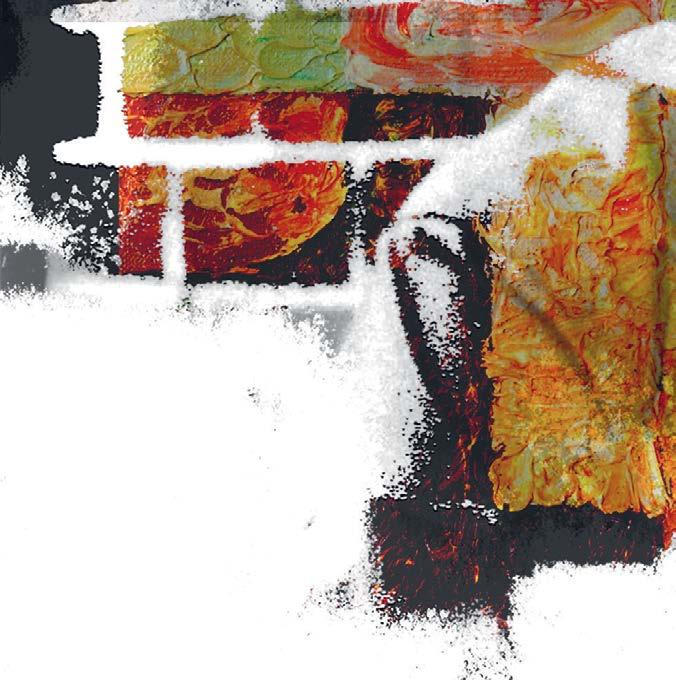







WHATISIT?



WHOCANAPPLY?
WHOWASKIRKROBSON?
TheFund(upto$5000)animatesthe conversationbetweentheologyandthe arts.Itsupportscreativeinitiativesengaging communitiesandartistsincollaborativeprojects seekingsocialjustice.Indigenousparticipation andinclusionisencouraged.Theological reflectionwillformakeyaspectoftheproject, articulatingthelearningsandexperienceofthe communityastheyengageinit.
Youareanindividual,acommunity,smallgroup oranincorporatedbody.Youareanartistora groupofartists,researcher/s,congregation, schooloragency.



Kirkwasacharismaticperformer,musician, UCAelderandArtisticDirectorofMelbournebasedtheatrecompanyTheTorchproject. HisCommunityCulturalDevelopmentapproach soughttoembodyreconciliationwithAboriginal peopleandtolistentothosewhosevoices areoftennotheard,andencouragediverse communitiestocreatepowerfultheatre. Kirkdiedin2005,aged27.
WHENDOAPPLICATIONSCLOSE?
September30,2024
WHEREDOIGETMOREINFORMATION?
Email:grants@victas.uca.org.au




'Jesus Sophia: Returning to Woman Wisdom in the Bible, Practice and Prayer', written by Pilgrim Theological College Lecturer in New Testament, Rev Dr Sally Douglas, has been shortlisted for the 2024 Australian Christian Book of the Year. This year’s winner will be announced on August 22. Below is an excerpt from the book’s first chapter.
At the heart of Christian faith is the wild proclamation that in the person of Jesus “all the fullness of God was pleased to dwell” (Col 1:19).
All the fullness. On the deepest of levels, if this is true, this means that in Jesus’ living and being as recorded in the Gospels—in Jesus’ teaching and serving, feasting with and feeding, healing and befriending, liberating, challenging, and exposing evil, and in Jesus’ nonviolent dying and rising in forgiveness—we encounter the fullness of who and how God is.
This reality requires not simply our intellectual acquiescence, or the recitation of particular words.
Instead, this demands the transformation of our understandings of God, the reshaping of our priorities and the remaking of the contours of our relationships, as we continue to look to-and seek to be with-this One.
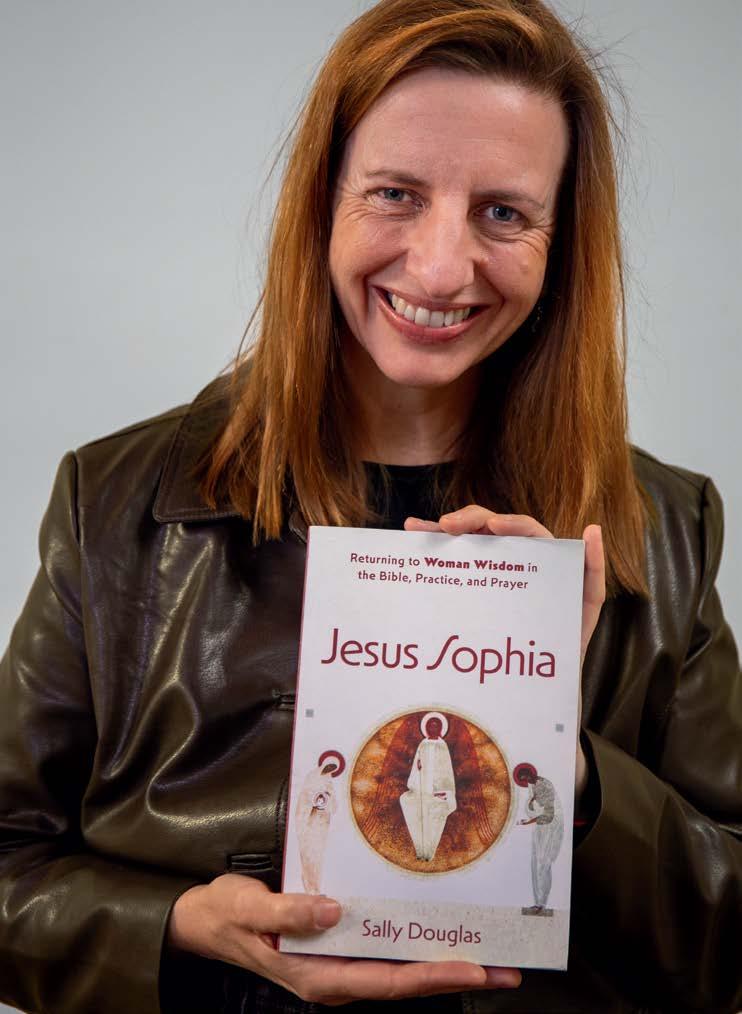
insistence upon pretending that Jesus is white.
Perhaps this is why in the church we often prefer to slice off and preserve those aspects of Jesus that fit most easily within our own existing narratives …
Time and again we Christians tend to whittle down our images of Jesus to reflect various versions of our own image, or the images of those who hold power.
We see this pattern of crafting Jesus into our preferred likeness expressed in a multiplicity of ways.
In the West, there is stubborn
For churches soaked in anti-Semitism, Jesus’ Jewishness is eradicated.
Across cultures and denominations, churches who wish to avoid Jesus’ disruptive call in the Gospels to live in radical generosity and in solidarity with the poor, focus on Jesus’ crucifixion and emphasise life in the realm beyond death.
For those denominations who seek only an ethics-based Christianity, claims about Jesus’ divinity in the New Testament are minimised.
All around the globe, in Christian churches in which patriarchal power structures dominate, androcentric constructions of God-as-male prevail.
This is despite the reality that, as we will discover, the New Testament evidence indicates that Jesus is celebrated in the language and imagery of the female divine in the earliest church.
Destructive consequences flow from each of these, and other, habits of making Jesus, the God One, small and conveniently packaged to fit within our own lives with minimal inconvenience.
This book does not seek to challenge the multitude of idols that the church has made.
Instead, we will explore just one aspect of the fullness of Jesus, as the fullness of God—an aspect that has been ignored and minimised for century upon century ... As we will trace together, within the biblical text, in the Gospels, in the letters, and in some of the earliest evidence we have in Christianity (hymn and prayer fragments embedded within these New Testament texts), again and again Jesus is celebrated in the language and imagery of the female divine … who is called Woman Wisdom or Sophia.
For too long clergy, church members, theologians, the curious, the angry, and the searchers have been deprived of this disruptive, nourishing, and orthodox understanding of Christian faith.
Ken Baker says while the Airport West Uniting Church congregation may be an ageing one, that doesn’t mean its members are resting on their laurels.
Church Council Chair Ken says congregation members have a big heart and believe that missional work and support for the community should be at the forefront of what they do.
“It’s a very open and friendly congregation, which always welcomes newcomers,” Ken says.
“Congregational members describe Airport West Uniting Church as welcoming, caring, friendly, energetic, practical, prayerful, ecumenically minded, dedicated, hard-working, generous, supportive and devoted to others.
“But we’re not just sitting back and relaxing.
“All of the members believe part of being a Uniting Church congregation is one involving giving and being part of the community, and in that regard it’s a very caring congregation.”
While not a huge congregation, with numbers around the 40 mark at most services, it’s one with an extremely strong missional focus, something Ken witnesses on a regular basis.
“Yes, it’s an ageing congregation, with a number of members in their 80s and 90s, but, it’s one which is very much outreach and mission focused,” he says.
That focus on mission and the concept of Faithful Giving continues to drive the good work carried out by the congregation.
That work can be traced back to a strategic decision made nearly 20 years ago by members of two congregations.
Airport West Uniting Church was formed through the amalgamation of the former Keilor East and Airport West congregations, evolving from a link established in 2006.
By Andrew Humphries
In 2012 the congregation decided to sell the Keilor East site and use the proceeds to renovate and extend the Airport West Site.
Following further consideration, it was then decided that the Airport West building should be demolished, and a new facility built, a decision which opened up the sale of two blocks of land which were no longer required.
Ken says it was that far-sighted decision, and the financial boost that resulted from it, that has allowed Airport West members to carry out substantial and ongoing missional work, both within and outside the Uniting Church.
“The positive out of this for us was that it guaranteed us an ongoing income,” he says.
While the congregation makes a substantial annual financial commitment to the Uniting Church at a Synod level, with a yearly contribution to the mission and service program, an additional 5 per cent of its total previous year’s annual income is directed towards mission projects at international, national, state and local level.
“We have a mission projects team and they look at what funds we get in each year and how that might be allocated to different charities,” Ken says.
“The priority, of course, is those charities associated with the Uniting Church, like Food for Families, but we have supported charities overseas if some form of emergency has come up.
“We also have a benevolent fund which is used to support local people and groups experiencing difficulty.”
As well as the benevolent fund, ongoing support to a number of charities comes in the form of donations of food and toys.
In 2022, Airport West members held an Autumn Fair, a Spring Fair and a Christmas Market Day, with the proceeds
from the market going to support Victorian flood relief.
That community involvement is a big part of what makes the congregation tick, says Ken, with members always keen to support groups wanting to make use of its facilities, meaning they are used most days of the week.
“A Samoan Seventh-day Adventist congregation uses the church, and we have a men’s group, friendship groups, and a children’s dance group using it, as well as canasta, knitting and creative living groups,” Ken says.
The congregation is also involved with service clubs Rotary and Probus and has, over the last few years, hosted a number of community meetings, including gambling and drug forums.
Ken says the congregation has fostered a strong relationship with members of the Gladstone Park congregation, with both congregations sharing a supply Minister to lead worship services.
Ken is hopeful a Minister will be appointed on a permanent basis soon, able to conduct two services a month at Airport West and two at Gladstone Park, with both congregations contributing to the cost.
“As the congregation seeks to live out its missional objectives, it hopes for new life and ministry in the next few years,” Ken says.
Your FAITHFUL GIVING supports the wider church by funding grants; training for ministry candidates and local leaders, Presbytery Ministers and ministry; Crosslight, websites and e-news; resources to assist in worship, witness and service; equipping Leadership for Mission (eLM); providing services to help meet obligations to keep our people and properties safe; and supporting church communities in rural and remote regions.

By Andrew Humphries

To suggest Joy Han has a thirst for knowledge hardly does her justice.
Since deciding seven years ago to enrol in courses through Pilgrim Theological College, Joy has been a textbook study in success.
That success was recognised in March when the Northcote Uniting Church member was named Vice-Chancellor’s Scholar and also gave a short address at Pilgrim’s graduation ceremony.
It was the perfect culmination to an educational journey with Pilgrim which began seven years ago and coincided with a period of discernment Joy was undertaking.
Theological study had always been an ambition and, with some encouragement from friends, she enrolled in one subject, which she was able to undertake outside her career in information technology.
“Around that time in 2017 there was an initiative called Pilgrim Pathways, which then opened up the possibility of doing some more subjects,” Joy says.
“I enrolled in a Graduate Diploma of Theology and I was able to do that because evening classes were offered as part of it.
“The emergence of Covid-19 also saw an expansion of online courses and that offered me a choice of more subjects to study.”
Not satisfied with completing a Graduate Diploma in Theology, the positive learning environment at Pilgrim meant Joy could set her sights even higher.
“As I was completing the Graduate Diploma I realised how much I had enjoyed it, and wanted to do more study, and that expanded into doing a Master of Theological Studies,” she says.
“I joke that it almost came about by accident, because I didn’t set out to do a Masters, I just built on that one subject which started it all.
“What made it all possible was those online and evening courses, which were perfect for someone like me who had a 9-5 job.”
In her address at the graduation ceremony, Joy paid tribute to the wonderful support from academic staff at Pilgrim.
“Theological education has allowed me to explore my calling with both openness and conviction, where previously I had much passion but limited capacity to discern,” she said.
“Now I know I’m equipped to discuss … how theology actually has everything to do with working life, and indeed all of life.
“I hope more and more people will access the transformative gift of theological education.”
Joy says the quality of teaching offered at Pilgrim was a key reason for her being able to successfully tackle her studies while continuing to work fulltime.
“It challenged me in a good way and opened me up to a broader conversation around the Christian tradition,” she says.
“It was an enthralling experience and a totally new world from what I had experienced in congregational life.
“As someone who graduated with a BA in Sociology and History, I had a real thirst to connect my experience of faith with a lot of social and philosophical questions that came up in my study.
“I knew that there were theological resources out there but it was only through theological study that I was able to deeply engage with them.
“I think so many lay people out there are hungry for that engagement and that’s why it’s so important that those theological subjects and courses are available online and are accessible to them.
“I’m a lay person who has now been equipped and resourced to explore questions around what is my vocation, and gifts, and how I can best share them.
“There is nothing special about me except that I have been able to gain those opportunities through theological study, and I would recommend it to any lay person.”
Associate Professor of New Testament Studies at Pilgrim, Robyn Whitaker, says Joy deserves every accolade for her achievements, exemplified by her ViceChancellor’s award and address at the graduation ceremony.
“Both are a huge honour and I can’t remember the last time a Pilgrim student received both,” she says.
“Joy is a great example of a younger, non-candidate student who has put herself through a theology degree out of pure interest and passion.
“She is also a key lay leader in the Uniting Church in Australia.”
The Otira Book Club allows communities and church groups to come together through a shared love of reading and the informative discussions that follow. The book club is a free service and becoming part of it is a very simple process. For more details visit the Otira Book Club webpage on the Synod website: victas.uca.org.au/otira-book-club/
‘Engage All Generations: A Strategic Toolkit for Creating Intergenerational Faith Communities’
Edited by Corey Seibel
Review by Rev Sandy Brodine
‘Engage All Generations’ is a compilation of essays by leading international practitioners and academics in children, youth and families ministry, focusing on how we can live and worship intergenerationally.
Divided into three sections:
‘Learning and together’, ‘Praying and playing together’, and ‘Leading and changing together’, it includes practical and accessible ideas for growing
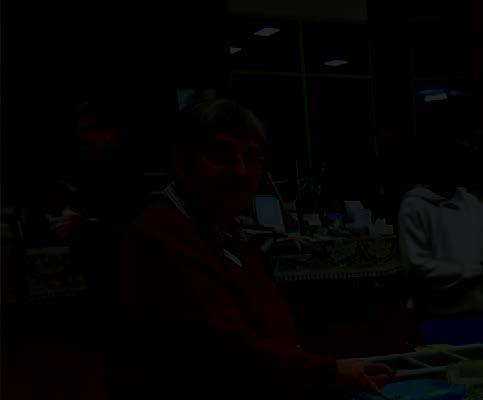
intergenerational faith communities that can be taken and used in local churches.
Each essay is a gem worth chewing over in your community.
From theology of child and godly play, to reflections on building intergenerational community, this book has it all.
One insight from New York Minister and youth ministry expert Michael Droege had me thinking for a while.
“Youth work is only truly alive in a church that is fully caught up in the work God is doing in God’s creation and in which young people are encouraged to participate … in the issues dominating their generation,” Michael writes.
How would it be if we genuinely listened to, and took the lead from our young people in choosing which issues we engaged with?
Would we be able to learn mutually from one another, and grow together as disciples of Christ?
Would we grow together as disciples if we genuinely played, and prayed together? This book is available from the Otira Book Club library: why not borrow and read with your intergenerational ministry team?
Rev Sandy Brodine is Younger Generations: Education and Strategy Coordinator within equipping Leadership for Mission.

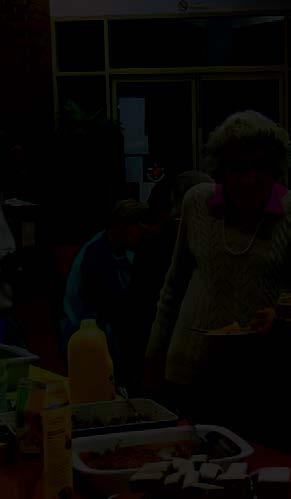
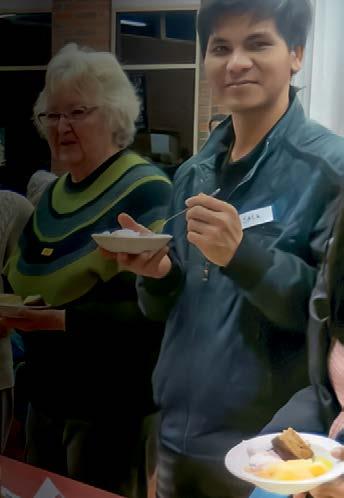
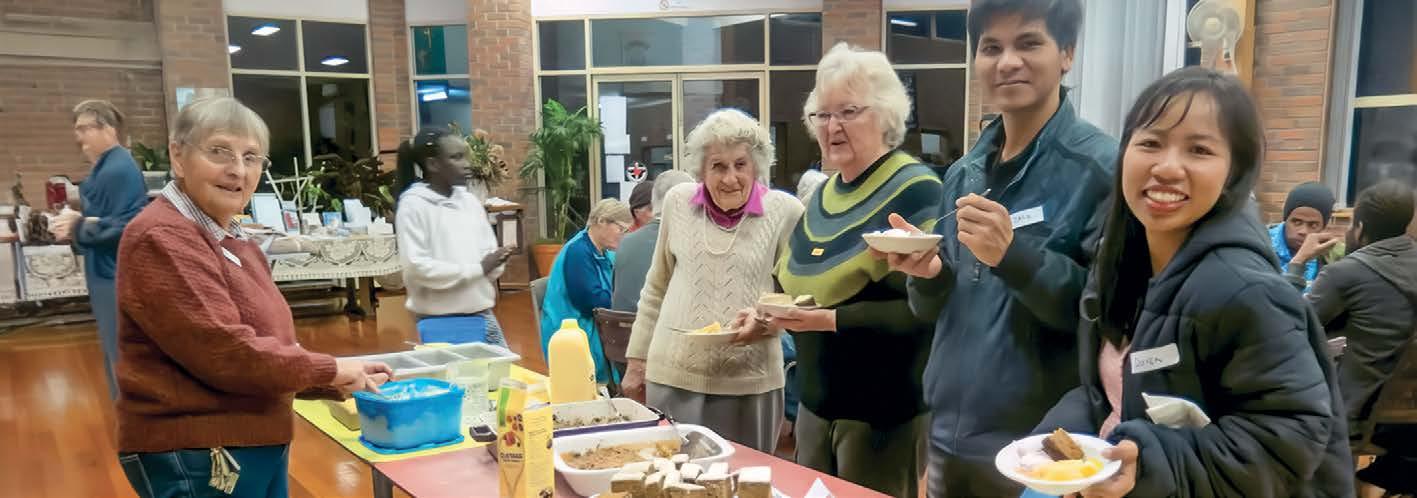
Food is an integral part of life in our Christian communities, and there are many social justice dimensions to what we eat. The convention, through a number of workshops, will explore the social justice issues of food production and how to account for them in church life.
When: Saturday October 5, 9am-4.15pm
Where: Centre for Theology and Ministry, 29 College Crescent, Parkville
Cost: $40 Metropolitan $25 Concession, Rural and Regional For full details and registration visit: events.humanitix.com/justice-and-international-mission-convention-2024
By Talitha Fraser
At East Gippsland’s Johnsonville Uniting Church, a small congregation is showing a big commitment towards lifesaving health and wellbeing outcomes that start locally and extend across Oceania.
Working with Birthing Kit Foundation of Australia, Johnsonville members are saving the lives of mothers and babies in the Pacific Islands by providing a simple $5 birthing kit.
Wendy Flahive is one of the Johnsonville congregation members at the forefront of this work, her professional experience as a nurse and midwife proving perfect for the role.
“My interest in doing this is because I've done a lot of work in the different communities across the Pacific, both with AusAid and through Uniting World, and that's where I got interested in helping people,” Wendy says.
“You can empower somebody with such simple information.
“It's really amazing because it's stuff we take for granted, yet I take over some pamphlets and they're taken home as precious.”
Johnsonville has rallied support from Bairnsdale, Glen Waverly and Paynesville congregation members, as well as local op shops, to support the project financially, while local volunteers have assembled the kits.
In June last year, 200 birthing kits were sent to Tarawa in the Republic of Kiribati via a collaboration with the Kiribati Uniting Church.
Holding a communal vision allows the congregation to strategise for the long term, as well as deepen and grow
existing relationships and networks, allowing for exponential reach.
This model allows local women to be trained in how to use the kits, before taking them back to their communities to distribute.
This year, RAK Women’s Centre coordinator Maata Yetze has obtained a grant from the Birthing Kit Foundation of Australia to receive 1000 kits directly, marking a sustainable project in which ministers and lay preachers will continue to take the kits to the most remote places.
The focus for Johnsonville members now moves to getting much-needed birthing kits to the Solomon Islands, especially the Western Province where the Uniting Church has a strong presence.
The small Johnsonville congregation credits its success with projects like birthing kits to being prepared to pivot to a new model as numbers shrank.
They have also been heartened by support from bigger congregations, especially Glen Waverley, where they join worship via Zoom, and more recent connections with the Bairnsdale and Paynesville congregations.
Where a larger congregation might have a council considering funding requests, decision making determined by a schedule of meetings, or many projects competing for outreach allocation, this small group of members have little turnover in their positions of office and are pleased to report that doing business is easier when everyone is on the same page.
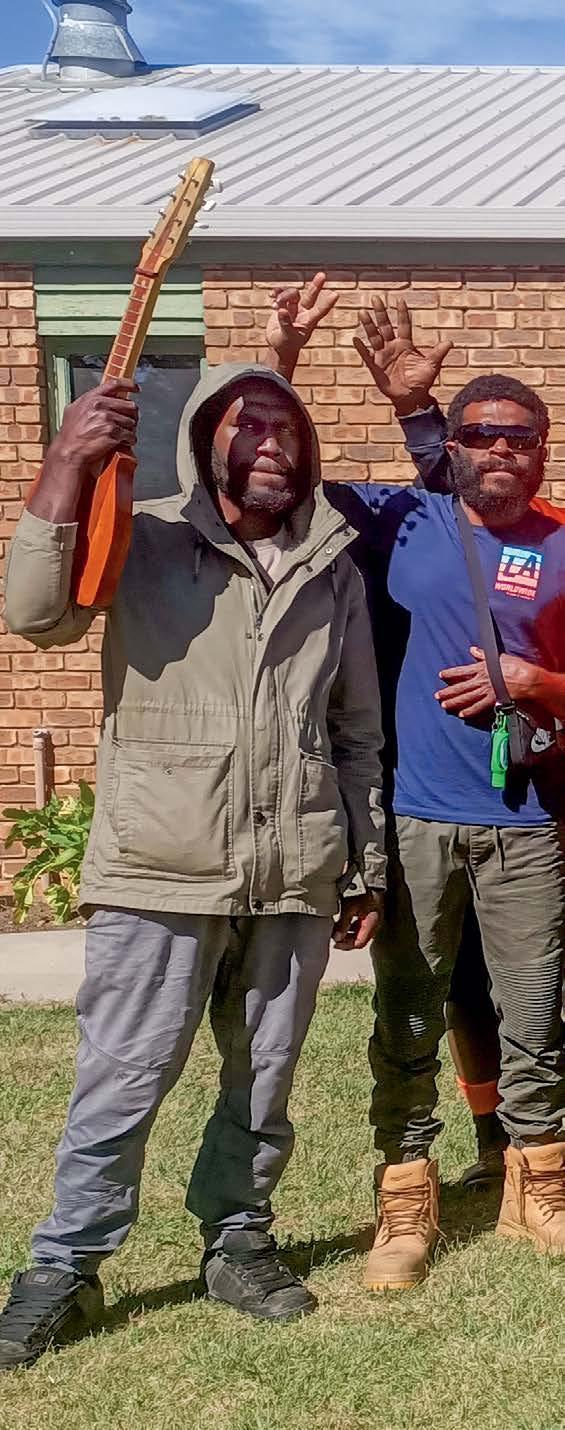
The congregation’s last AGM took only 30 minutes and ratified their ongoing commitment, spanning more than two decades, to projects to promote physical and social wellbeing for the people of the Pacific Islands, with the focus on maternal health care and the support of seasonal workers.
At home, this focus continues on making connections with workers, from a number of Pacific Island countries, who are in Australia picking and packing vegetables around Lindenow.
While the seasonal workers are keen to attend church, language, transport, and other issues can make this difficult.
With the support of representatives from other denominations, Johnsonville congregation members provide a monthly barbecue for the Pacific Island workers, in addition to ongoing support in other areas.
While the Johnsonville congregation may not be large in number, there is
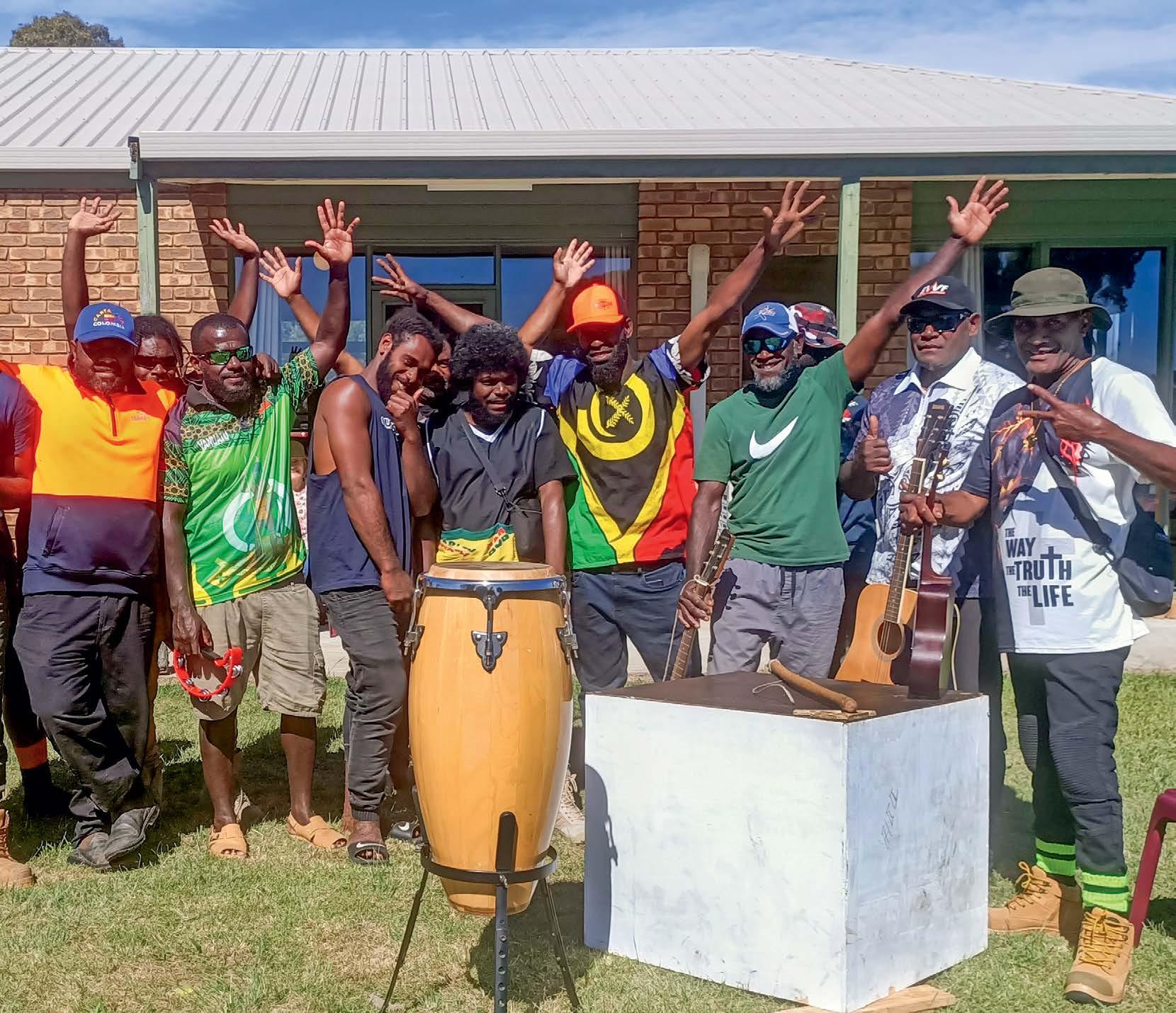
plenty of optimism around its future.
Worshipping online with the Glen Waverley congregation is wonderful, although Wendy admits it would be nice to have their own minister.
“It would be wonderful, and we would all much prefer it,” she says.
“But if they don’t turn up, we are doing just fine for now.
“Our journey is Godfocused, so we don’t need to worry about that.”
While it might be tempting to focus on what they don’t have, congregation members instead get on with their work grateful for the abundance of gifts and resources available to them to contribute to, and receive from, the body of the wider Uniting Church.
